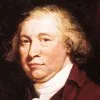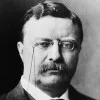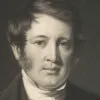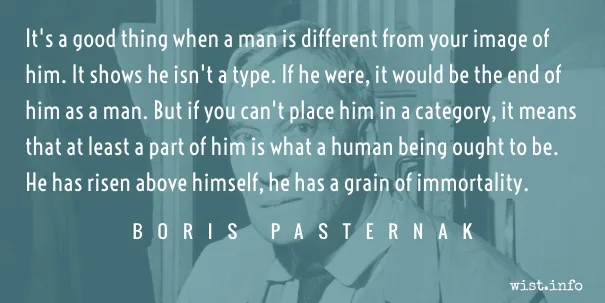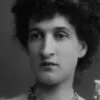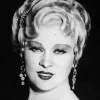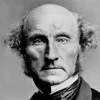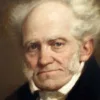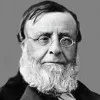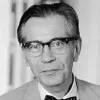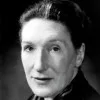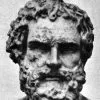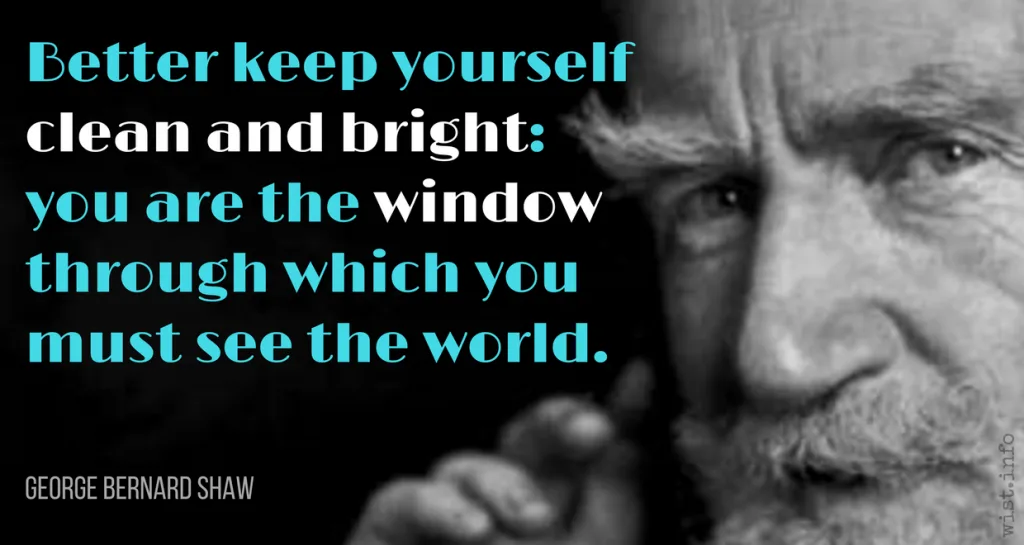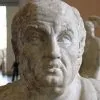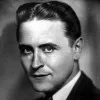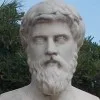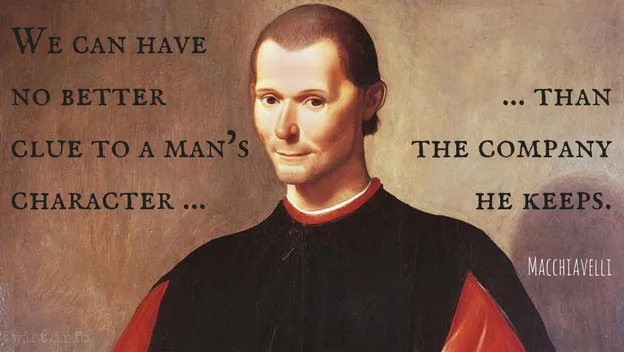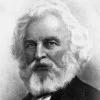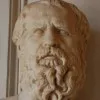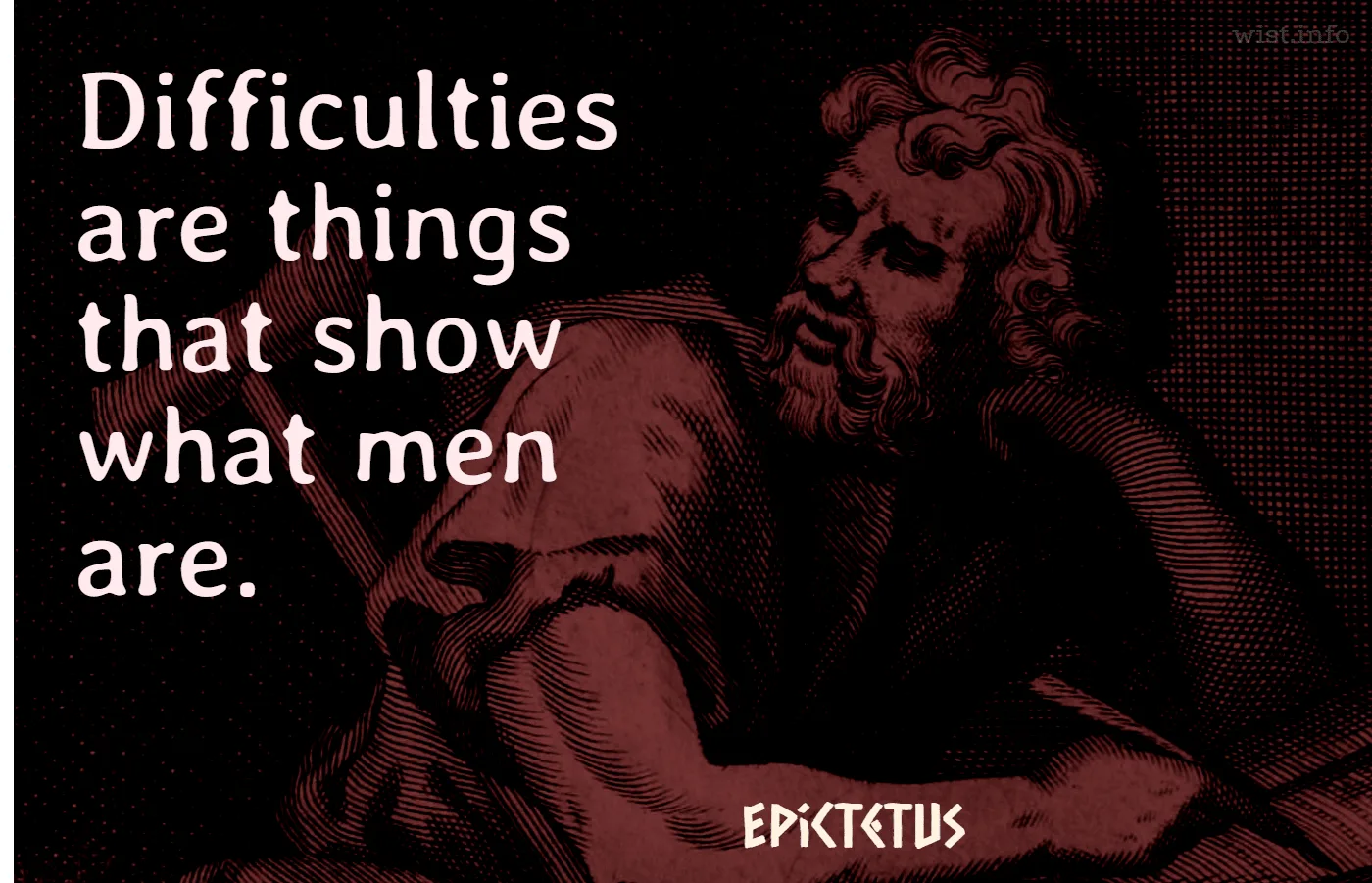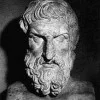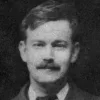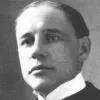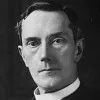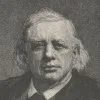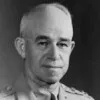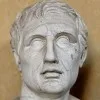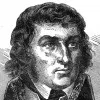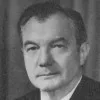Preoccupation with money is the great test of small natures, but only a small test of great ones
[L’intérêt d’argent est la grande épreuve des petits caractères, mais ce n’est encore que la plus petite pour les caractères distingués.]
Nicolas Chamfort (1741-1794) French writer, epigrammist (b. Nicolas-Sébastien Roch)
Products of Perfected Civilization [Produits de la Civilisation Perfectionée], Part 1 “Maxims and Thoughts [Maximes et Pensées],” ch. 2, ¶ 164 (1795) [tr. Mathers (1926)]
(Source)
(Source (French)). Alternate translations:Money is the greatest concern for small characters, but is nothing but the smallest for great characters.
[E.g. (1923)]Concern for money is the great test of small natures; but is scarcely a test at all for those who rise above the ordinary.
[tr. Merwin (1969)]Pecuniary gain is the great test for those of weak character, but for those wit out-of-the-ordinary characters it is of the slightest importance.
[tr. Pearson (1973)]The desire for money can go very far in proving that a person has a petty character, but it has little to say about a persons sincerity.
[tr. Siniscalchi (1994)]Weak characters think money all-important; for any well-bred person, it's a very minor concern.
[tr. Parmée (2003), ¶ 129]
Quotations about:
character
Note not all quotations have been tagged, so Search may find additional quotes on this topic.
We start out determined to see that our children are good; we soon settle for having them nice.
Mignon McLaughlin (1913-1983) American journalist and author
The Neurotic’s Notebook, ch. 2 (1963)
(Source)
The epic poet did not judge his heroes by the result: Heroes won and lost battles in a manner that was totally independent of their own valor; their fate depended upon totally external forces, generally the explicit agency of the scheming gods (not devoid of nepotism(. Heroes are heroes because they are heroic in behavior, not because they won or loss.
PHYSIOGNOMY, n. The art of determining the character of another by the resemblances and differences between his face and our own, which is the standard of excellence.
Ambrose Bierce (1842-1914?) American writer and journalist
“Physiognomy,” The Devil’s Dictionary (1911)
(Source)
Originally published in the "Cynic's Word Book" column in the New York American (1905-01-11) and the "Cynic's Dictionary" column in the San Francisco Examiner (1905-03-18).
Of course everybody likes and respects self-made men. It is a great deal better to be made in that way than not to be made at all.
The chaplain had mastered, in a moment of divine intuition, the handy technique of protective rationalization, and he was exhilarated by his discovery. It was miraculous. It was almost no trick at all, he saw, to turn vice into virtue and slander into truth, impotence into abstinence, arrogance into humility, plunder into philanthropy, thievery into honor, blasphemy into wisdom, brutality into patriotism, and sadism into justice. Anybody could do it; it required no brains at all. It merely required no character.
In fact, were it given to our human eye to see into the consciences of others, we would judge a man much more surely from what he dreams than from what he thinks.
[En effet, s’il était donné à nos yeux de chair de voir dans la conscience d’autrui, on jugerait bien plus sûrement un homme d’après ce qu’il rêve que d’après ce qu’il pense.]
Victor Hugo (1802-1885) French writer
Les Misérables, Part 3 “Marius,” Book 5 “The Excellence of Misfortune,” ch. 5 (3.5.5) (1862) [tr. Wilbour/Fahnestock/MacAfee (1987)]
(Source)
(Source (French)). Alternate translations:In fact, were it given to our eye of flesh to see into the consciences of others, we should judge a man much more surely from what he dreams than from what he thinks.
[tr. Wilbour (1862)]In fact, if our eyes of the flesh were allowed to peer into the consciences of our neighbor, a man could be judged far more surely from what he dreams than from what he thinks.
[tr. Wraxall (1862)]In fact, had it been given to our eyes of the flesh to gaze into the consciences of others, we should be able to judge a man much more surely according to what he dreams, than according to what he thinks.
[tr. Hapgood (1887)]Indeed, if our earthly eyes possessed this power of seeing into the hearts of others, we would judge men far more surely by their dreams than by their thoughts.
[tr. Denny (1976)]For had it been given to our eyes of flesh to see into the conscience of others, our judgment of a man would be much sounder were it based on what he dreams rather than on what he thinks.
[tr. Donougher (2013)]
ELECTRA: What deceived you the most, what you misunderstood,
Is that someone cannot be strong because of money.
Money can only stay with us for a brief time.
Character is strength, not money.
Character always stands at our sides and bears our troubles.
Wealth shacks up with fools unjustly and then disappears
Leaving their houses after it bloomed for a little while.[ἨΛΈΚΤΡΑ: ὃ δ᾿ ἠπάτα σε πλεῖστον οὐκ ἐγνωκότα,
ηὔχεις τις εἶναι τοῖσι χρήμασι σθένων·
τὰ δ᾿ οὐδὲν εἰ μὴ βραχὺν ὁμιλῆσαι χρόνον.
ἡ γὰρ φύσις βέβαιος, οὐ τὰ χρήματα.
ἡ μὲν γὰρ αἰεὶ παραμένουσ᾿ αἴρει κακά·
ὁ δ᾿ ὄλβος ἀδίκως καὶ μετὰ σκαιῶν ξυνὼν
ἐξέπτατ᾿ οἴκων, σμικρὸν ἀνθήσας χρόνον.]Euripides (485?-406? BC) Greek tragic dramatist
Electra [Ἠλέκτρα], l. 938ff (c. 420 BC) [tr. @sentantiq (2020)]
(Source)
Addressing the corpse of Aegisthus.
(Source (Greek)). Alternate translations:But here lay
Thy error; thou didst deem thyself a man
Able to rule, because thou wert possess'd
Of wealth, which in itself is nought, and stays
For a short season only with its owner:
But Nature, and not Gold, is ever firm;
Nature abides with man, and can remove
Evils the most severe, while lawless Gold,
That inmate of the wicked, takes his flight
From mansions where he flourish'd but a moment
[tr. Wodhull (1809)]Herein lay thy grievous error, due to ignorance; thou thoughtest thyself some one, relying on thy wealth, but this is naught save to stay with us a space. 'Tis nature that stands fast, not wealth. For it, if it abide unchanged, exalts man's horn. But riches dishonestly acquired and in the hands of fools, soon take their flight, their blossom quickly shed.
[tr. Coleridge (1891)]Which thing has most deceived thee, not knowing it. Thou didst boast to be somebody, relying on thy wealth; but wealth is naught, except to tarry with us for a little time. But nature is stable; not money: since the one ever remaining uplifts her head; but wealth unjust, and dwelling with the foolish, is wont to flit from the house, having flourished for a short season.
[tr. Buckley (1892)]This was thy strong delusion, blind of heart,
Through pride of wealth to boast thee some great one!
Nought wealth is, save for fleeting fellowship.
'Tis character abideth, not possessions:
This, ever-staying, lifteth up the head;
But wealth by vanity gotten, held of fools,
Takes to it wings; as a flower it fadeth soon.
[tr. Way (1896)]And then the lie of lies that dimmed thy brow,
Vaunting that by thy gold, thy chattels, Thou
Wert Something; which themselves are nothingness,
Shadows, to clasp a moment ere they cease.
The thing thou art, and not the things thou hast,
Abideth, yea, and bindeth to the last
Thy burden on thee: while all else, ill-won
And sin-companioned, like a flower o'erblown,
Flies on the wind away.
[tr. Murray (1905)]This deceived you the most, in your ignorance: you professed to be some one, strong in your wealth, but that is nothing, except to associate with briefly. It is nature that is secure, not wealth; for, always standing by, it takes away troubles; but prosperity, when it lives wickedly and with fools, flies out of the house, flowering for a short time.
[tr. Coleridge (1938 ed.)]And you, Aigisthus, because of your lack of intelligence, fell into a big trap which is that you thought that the great wealth made you important. Yet wealth is not something you can have for long.
A man’s strength is his nature, not his wealth because that is what stays with us and that is what defeats our troubles. When the unjust joy falls into sinful ways, it blossoms in the house for a very short time before it flies away again.
[tr. Theodoridis (2006)]But most of all,
you were so ignorant you were deceived
in claiming to be someone because your strength
was in your wealth. But that’s not worth a thing --
its presence is short lived. What stays secure
is not possessions but one’s nature, which stands
beside you and takes away your troubles.
But when riches live with fools unjustly,
they bloom a little while, then flee the house.
[tr. Johnston (2009)]Now here's where you deceived yourself the most: that you had wealth, and thought it made you someone. But money's nothing: here and gone again. Trust nature, it's secure. Riches are not. Nature remains forever, helps in trouble. Prosperity that lives a while with fools briefly flowers with evil, then flies from home.
[tr. Wilson (2016)]
Those who quit their proper character to assume what does not belong to them are, for the greater part, ignorant both of the character they leave and of the character they assume.
Edmund Burke (1729-1797) Anglo-Irish statesman, orator, philosopher
Reflections on the Revolution in France (1790)
(Source)
On preachers who mix politics into their sermons.
ORESTES: Ye Gods! There’s no art to tell a decent man,
since generations work haphazardly.
I’ve encountered worthless men, the sons
of noble fathers; good men born from bad;
and I’ve seen hunger in a rich man’s mind,
a poor man’s body housing thoughts sublime.[ὈΡΈΣΤΗΣ: φεῦ:
οὐκ ἔστ᾽ ἀκριβὲς οὐδὲν εἰς εὐανδρίαν:
ἔχουσι γὰρ ταραγμὸν αἱ φύσεις βροτῶν.
ἤδη γὰρ εἶδον ἄνδρα γενναίου πατρὸς
τὸ μηδὲν ὄντα, χρηστά τ᾿ ἐκ κακῶν τέκνα,
λιμόν τ᾿ ἐν ἀνδρὸς πλουσίου φρονήματι,
γνώμην δὲ μεγάλην ἐν πένητι σώματι.]Euripides (485?-406? BC) Greek tragic dramatist
Electra [Ἠλέκτρα], l. 367ff (c. 420 BC) [tr. Wilson (2016)]
(Source)
(Source (Greek)). Alternate translations:There is no certain mark of generous souls:
For in the tempers of mankind prevails
A strange confusion. I have seen the son
Of a great father dwindle into nothing.
And virtuous children spring from wicked Sires;
Among the rich a mean contracted spirit
Have I discover'd, and the poor man's breast
Withi most exalted sentiments inspir'd.
[tr. Wodhull (1809)]Ah! there is no sure mark to recognize a man's worth; for human nature hath in it an element of confusion. For I have seen ere now the son of a noble sire prove himself a worthless knave, and virtuous children sprung from evil parents; likewise dearth in a rich man's spirit, and in a poor man's frame a mighty soul.
[tr. Coleridge (1891)]Alas! there is no sure mark of manliness; for the natures of mortals exhibit a confusion. For already have I seen a man who was naught sprung from a noble sire, and good children [sprung] from bad [fathers[,. and hunger in the spirit of a rich man, and a great mind in a poor body.
[tr. Buckley (1892)]Lo, there is no sure test for manhood’s worth:
For mortal natures are confusion-fraught. --
I have seen ere now a noble father’s son
Proved nothing-worth, seen good sons of ill sires,
Starved leanness in a rich man’s very soul,
And in a poor man’s body a great heart.
[tr. Way (1896)]How dark lies honour hid! And what turmoil
In all things human: sons of mighty men
Fallen to naught, and from ill seed again
Good fruit: yea, famine in the rich man's scroll
Writ deep, and in poor flesh a lordly soul.
[tr. Murray (1905)]Ah! There is no exact way to test a man's worth; for human nature has confusion in it. I have seen before now the son of a noble father worth nothing, and good children from evil parents; famine in a rich man's spirit, and a mighty soul in a poor man's body.
[tr. Coleridge (1938 ed.)]It is impossible to judge a man’s virtue with accuracy. There’s always great confusion in the nature of mortals. I, myself, have seen worthless children born of a virtuous man and from evil parents born brilliant children. I have seen a small, poor mind in a wealthy man and in the soul of a poor man, a great one.
[tr. Theodoridis (2006)]Well, nothing is precise
when it comes to how a man is valued --
men’s natures are confusing. Before this,
I’ve seen a man worth nothing, yet he had
a noble father; I’ve known evil parents
with outstanding children, seen famine
in a rich man’s mind and a great spirit
in a poor man’s body.
[tr. Johnston (2009)]I have known a man of a noble father who turns out
To be nothing while powerful men can rise from the low.
I have seen emptiness in a rich man’s thought
And great judgement in a poor person’s frame.
[tr. @sententiq (2020)]
We’re all capable of doing great things, and of doing bad things. We have the angels and the demons inside of us, and our lives are a succession of choices. Look at a figure like Woodrow Wilson, one of the most fascinating presidents in American history. He was despicable on racial issues. He was a Southern segregationist of the worst stripe, praising D.W. Griffith and The Birth of a Nation. He effectively was a Ku Klux Klan supporter. But in terms of foreign affairs, and the League of Nations, he had one of the great dreams of our time. The war to end all wars — we make fun of it now, but God, it was an idealistic dream. If he’d been able to achieve it, we’d be building statues of him a hundred feet high, and saying, “This was the greatest man in human history: This was the man who ended war.” He was a racist who tried to end war. Now, does one cancel out the other? Well, they don’t cancel out the other. You can’t make him a hero or a villain. He was both. And we’re all both.
George R. R. Martin (b. 1948) American author and screenwriter [George Raymond Richard Martin]
Interview (2014-04-23) by Mikal Gilmore, “The Rolling Stone Interview,” Rolling Stone
(Source)
You can tell the size of a man by the size of the thing that makes him mad.
Adlai Stevenson (1900-1965) American diplomat, statesman
Speech (1952-08-28), “Faith in Liberalism,” State Committee of the Liberal Party, New York City
(Source)
If a public man tries to get your vote by saying that he will do something wrong in your interest, you can be absolutely certain that if ever it becomes worth his while he will do something wrong against your interest.
Theodore Roosevelt (1858-1919) American politician, statesman, conservationist, writer, US President (1901-1909)
Speech (1910-04-23), “Citizenship in a Republic [The Man in the Arena],” Sorbonne, Paris
(Source)
She may safely wear elegant garments, who in character and bearing is elegant without their aid. If honour be your clothing, the suit will last a life-time, but if clothing be your honour, it will soon be worn thread-bare.
William Arnot (1808-1875) Scottish minister and theological writer
Laws from Heaven for Life on Earth: Illustrations of the Book of Proverbs, ch. 49 (1858)
(Source)
Commentary on Proverbs 31:25: "Strength and honor are her clothing; and she shall rejoice in time to come." [KJV]
For the great law of culture is: Let each become all that he was created capable of being; expand, if possible, to his full growth; resisting all impediments, casting off all foreign, especially all noxious adhesions; and show himself at length in his own shape and stature, be these what they may.
Thomas Carlyle (1795-1881) Scottish essayist and historian
“Jean Paul Friedrich Richter,” Edinburgh Review No. 91, Art. 7 (1827-06)
(Source)
A review of Heinrich Döring, Jean Paul Friedrich Richter's Life, with a Sketch of His Works (1826).
We are held to our duty by laziness and timidity, but often our virtue gets all the credit.
[Pendant que la paresse et la timidité nous retiennent dans notre devoir, notre vertu en a souvent tout l’honneur.]François VI, duc de La Rochefoucauld (1613-1680) French epigrammatist, memoirist, noble
Réflexions ou sentences et maximes morales [Reflections; or Sentences and Moral Maxims], ¶169 (1665-1678) [tr. Tancock (1959)]
(Source)
Appeared in the 1st ed. (1665) as:While laziness and timidity alone have the merit of keeping us in our duty, our virtue often has all the honour.
[Pendant que la paresse et la timidité ont seules le mérite de nous tenir dans notre devoir, notre vertu en a souvent tout l’honneur.]
In the manuscript version this read:Shame, laziness and timidity alone retain the merit of holding us back from our duty, while our virtue has all the honor.
[La honte, la paresse et la timidité conservent toutes seules le mérite de nous retenir dans notre devoir, pendant que notre vertu en a tout l’honneur.]
In a letter to J. Esprit, La Roswchefoucauold phrased it this way:It must be admitted that virtue, by which we boast of doing everything good that we do, would not always have the strength to hold us back from the rules of our duty, if laziness, timidity, or shame did not make us see the disadvantages of departing from them.
[Il faut avouer que la vertu, par qui nous nous vantons de faire tout ce que nous faisons de bien, n’aurait pas toujours la force de nous retenir dans les règles de notre devoir, si la paresse, la timidité, ou la honte ne nous faisoient voir les inconvénients qu’il y a d’en sortir.]
Variations of this sentiment around the hypocrisy of vices serving as virtue show up a lot in La Rochefoucauld's maxims. See the Epigraph, and ¶¶ 1, 200, 205, 218, 220, 237, 241, 253, 266, 354, and 442.
(Source (French)). Alternate translations:We are many times kept within the limits of our duty by Shame, Sloth, and Timorousness, while in the mean time our Virtue hath all the credit of it.
[tr. Davies (1669), ¶5]Many People are kept within their Duty, because they have not the Courage, or will not be at the pains of being wicked; and in such cases oftentimes our Vertue runs away with all the Praise.
[tr. Stanhope (1694), ¶170]Idleness, timidity, and shame, often keep us within the bounds of duty; whilst virtue seems to run away with the honour.
[pub. Donaldson (1783), ¶233; ed. Lepoittevin-Lacroix (1797), ¶163]Idleness, timidity, or shame, often keeps us within the bounds of duty; whilst virtue seems to run away with the honour of it.
[ed. Carvill (1835), ¶202]Indolence and timidity often keep us to our duty, while our virtue carries off all the credit of doing so.
[ed. Gowens (1851), ¶172]Idleness and fear keeps us in the path of duty, but our virtue often gets the praise.
[tr. Bund / Friswell (1871), ¶169]Although it is frequently laziness and timidity that keep us within the path of duty, it is virtue that reaps the credit.
[tr. Heard (1917), ¶169]Though indolence and timidity keep us to the path of duty, virtue often gets all the credit.
[tr. Stevens (1939), ¶169]When laziness or cowardice keeps us to the path of duty, the credit is often given entirely to our honour.
[tr. FitzGibbon (1957), ¶169]When laziness and timidity yokes us to our duties, we often give virtue the credit for it.
[tr. Kronenberger (1959), ¶169]While it is idleness and timidity that retain us in our duty, our virtue takes all the credit.
[tr. Whichello (2016), ¶169]
Not every great man is a great human being.
[Nicht jeder große Mann is ein großer Mensch.]
Marie von Ebner-Eschenbach (1830-1916) Austrian writer
Aphorisms [Aphorismen], No. 267 (1880) [tr. Scrase/Mieder (1994)]
(Source)
(Source (German)). Alternate translation:Not every great man is a grand human being.
[tr. Wister (1883)]
In daily life we are more often liked for our defects than for our qualities.
[Nous plaisons plus souvent dans le commerce de la vie par nos défauts que par nos bonnes qualités.]
François VI, duc de La Rochefoucauld (1613-1680) French epigrammatist, memoirist, noble
Réflexions ou sentences et maximes morales [Reflections; or Sentences and Moral Maxims], ¶90 (1665-1678) [tr. Tancock (1959)]
(Source)
This first appeared in the 5th Ed. (1678). See bottom for parallel maxims.
(Source (French)). Alternate translations:We are often more agreeable through our faults, than through our good qualities.
[pub. Donaldson (1783), ¶130; [ed. Lepoittevin-Lacroix (1797), ¶97]We often appear to be more agreeable in our faults than in our good qualities.
[ed. Carvill (1835), ¶114]In the intercourse of life we more often please by our faults than our good qualities.
[ed. Gowens (1851), ¶232]In the intercourse of life, we please more by our faults than by our good qualities.
[tr. Bund/Friswell (1871), ¶90]In everyday existence we please others more by our faults than by our merits.
[tr. Heard (1917), ¶228]In the ordinary intercourse of life our faults give more pleasure than our virtues.
[tr. Stevens (1939), ¶90]In daily life our faults are frequently more pleasant than our good qualities.
[tr. FitzGibbon (1957), ¶90]In the business of living our faults are often more attractive than our virtues.
[tr. Kronenberger (1959), ¶90]In our dealings with the world, we often please more by our faults than by our good qualities.
[tr. Whichello (2016), ¶90]
The attractiveness of vice or faults versus virtue in human nature was not an uncommon theme in La Rochefoucauld's maxims. Consider the following:There are some who are disgusting in their merits, and others who please with their faults.
[tr. Winchello (2016), ¶155]
[Il y a des gens dégoûtants avec du mérite, et d’autres qui plaisent avec des défauts.]
[1st ed.]There are people whose faults beseem them well, and others whose good qualities disgrace them.
[tr. Winchello (2016), ¶251]
[Il y a des personnes à qui les défauts siéent bien, et d’autres qui sont disgraciées avec leurs bonnes qualités.]
[1st ed.]There are people who enjoy the approval of the world whose sole merit consists in their having vices that are useful in the general affairs of life.
[tr. Winchello (2016), ¶273]
[Il y a des gens, qu’on approuve dans le monde, qui n’ont pour tout mérite que les vices qui servent au commerce de la vie.]
[1st ed.]There are certain faults which, when displayed in a flattering light, shine more brightly than virtue itself.
[tr. Winchello (2016), ¶354]
[Il y a de certains défauts qui, bien mis en œuvre, brillent plus que la vertu même.]
[4th ed.]There are bad qualities which make for great talents.
[tr. Winchello (2016), ¶468]
[Il y a de méchantes qualités qui font de grands talents.]
[5th ed.]
Be neither foolishly Bashful, nor nauseously Confident.
Thomas Fuller (1654-1734) English physician, preacher, aphorist, writer
Introductio ad Prudentiam, Vol. 1, # 104 (1725)
(Source)
How rich a man is all desire to know;
But none inquires if good he be or no.
In great actions men show themselves as they ought to be, in small actions as they are.
[Dans les grandes choses, les hommes se montrent comme il leur convient de se montrer; dans les petites, ils se montrent comme ils sont.]
Nicolas Chamfort (1741-1794) French writer, epigrammist (b. Nicolas-Sébastien Roch)
Products of Perfected Civilization [Produits de la Civilisation Perfectionée], Part 1 “Maxims and Thoughts [Maximes et Pensées],” ch. 1, ¶ 52 (1795) [tr. Hutchinson (1902), “The Cynic’s Breviary”]
(Source)
(Source (French)). Alternate translations:In great matters men show themselves as they ought; in little, as they are.
[tr. Mathers (1926)]In affairs of importance, men show themselves at their best advantage; in small matters they are seen as they are.
[tr. Merwin (1969)]In great things, men show themselves as they want to be seen; and in little ones they show themselves as they are.
[tr. Siniscalchi (1994)]In important matters, men display themselves as they want to be seen; in minor matters as they really are.
[tr. Parmée (2003), ¶45]
A musician would not willingly consent that his lyre should be out of tune, nor a leader of a chorus that his chorus should not sing in the strictest possible harmony; but shall each individual person be at variance with himself, and shall he exhibit a life not at all in agreement with his words?
[εἶτα μουσικὸς μὲν οὐκ ἂν ἑκὼν δέξαιτο ἀνάρμοστον αὐτῷ τὴν λύραν εἶναι, καὶ χοροῦ κορυφαῖος μὴ ὅτι μάλιστα συνᾷάδοντα τὸν χορὸν ἔχειν” αὐτὸς δέ τίς ἕκαστος διαστασιάσει πρὸς ἑαυτόν, καὶ οὐχὶ τοῖς λόγοις ὁμολογοῦντα τὸν βίον παρέξεται.]
Basil of Caesarea (AD 330-378) Christian bishop, theologian, monasticist, Doctor of the Church [Saint Basil the Great, Ἅγιος Βασίλειος ὁ Μέγας]
Address to Young Men on Reading Greek Literature, ch. 6, sec. 4 [tr. Deferrari/McGuire (1933)]
(Source)
A human being, Hastings, cannot resist the opportunity to reveal himself and express his personality which conversation gives him. Every time he will give himself away.
It’s a good thing when a man is different from your image of him. It shows he isn’t a type. If he were, it would be the end of him as a man. But if you can’t place him in a category, it means that at least a part of him is what a human being ought to be. He has risen above himself, he has a grain of immortality.
Boris Pasternak (1890-1960) Russian poet, novelist, and literary translator
Doctor Zhivago [До́ктор Жива́го], Part 2, ch. 9 “Varykino,” sec. 4 [Yuri] (1955) [tr. Hayward & Harari (1958), US ed.]
(Source)
Alternate translations:It’s a good thing when a man is different from your image of him. It shows he isn’t a type. If he were, it would be the end of him as a man. But if you can’t place him in a category, it means that at least a part of him is what a human being ought to be. He has a grain of immortality.
[tr. Hayward & Harari (1958), UK ed.]It’s good when a man deceives your expectations, when he doesn’t correspond to the preconceived notion of him. To belong to a type is the end of a man, his condemnation. If he doesn’t fall under any category, if he’s not representative, half of what’s demanded of him is there. He’s free of himself, he has achieved a grain of immortality.
[tr. Pevear & Volokhonsky (2010)]
What is the goal of parenting? It’s to help a child grow up to be a decent human being, a mensch, a person with compassion, commitment, and caring.
Haim Ginott (1922-1973) Israeli-American school teacher, child psychologist, psychotherapist [b. Haim Ginzburg]
Between Parent and Child, ch. 10 “Summing Up” (2003 ed.) [with A. Ginott and H. W. Goddard]
(Source)
To discern faults, though they be in fashion: Though Vice be clothed in cloth of gold, yet a good man will still know it. It is to no purpose for it to be apparelled in gold, it can never so well disguise it self but that it will be perceived to be of iron. It would cloak it self with the nobility of its Adherents, but it is never stript of its baseness, nor the misery of its slavery.
[Conocer los defectos, por más autorizados que estén. No desconozca la entereza el vicio, aunque se revista de brocado; corónase tal vez de oro, pero no por eso puede disimular el yerro. No pierde la esclavitud de su vileza aunque se desmienta con la nobleza del sujeto.]
Baltasar Gracián y Morales (1601-1658) Spanish Jesuit priest, writer, philosopher
The Art of Worldly Wisdom [Oráculo Manual y Arte de Prudencia], § 186 (1647) [Flesher ed. (1685)]
(Source)
(Source (Spanish)). Alternate translations:Recognise Faults, however high placed. Integrity cannot mistake vice even when clothed in brocade or perchance crowned with gold, but will not be able to hide its character for all that. Slavery does not lose its vileness, however it vaunt the nobility of its lord and master.
[tr. Jacobs (1892)]Know what is evil, however much worshiped it may be. Let the man of intelligence not fail to recognize it, even if clothed in brocade, or crowned with gold, because it cannot thereby hide its bane, -- slavery does not lose its infamy, however noble the master.
[tr. Fischer (1937)]Know when something is a defect, even if it looks like the opposite. Honesty should be able to recognize vice even when it dresses in brocade. Sometimes it wears a crown of gold, but even then it cannot hide its iron. Slavery is just as vile when disguised by high position.
[tr. Maurer (1992)]
‘Tis for little Souls, that truckle under the Weight of Affairs, not to know how clearly to disengage themselves, and not to know how to lay them aside, and take them up again.
[C’est aux petites ames ensevelies du poix des affaires, de ne s’en sçavoir purement desmesler : de ne les sçavoir et laisser et reprendre.]Michel de Montaigne (1533-1592) French essayist
Essays, Book 3, ch. 13 “On Experience [De l’Experience]” (1588) (3.13) (1595) [tr. Cotton (1686)]
(Source)
(Source (French)). Alternate translations:It is for base and pettie mindes, dulled and overwhelmed with the weight of affaires, to be ignorant how to leave them, and not to know how to free themselves from them; nor how to leave and take them againe.
[tr. Florio (1603)]’Tis for little souls, that truckle under the weight of affairs, not from them to know how clearly to disengage themselves, not to know how to lay them aside and take them up again.
[tr. Cotton/Hazlitt (1877)]It is for small souls, buried under the weight of affairs, not to know how to free themselves therefrom entirely; not to know how to leave them and return to them.
[tr. Ives (1925)]It is for little souls, buried under the weight of business, to be unable to detach themselves cleanly from it or to leave it and pick it up again.
[tr. Frame (1943)]It is for petty souls overwhelmed by the weight of affairs to be unable to disentangle themselves for them completely, not knowing how to drop them and then take them up again.
[tr. Screech (1987)]
As favour and riches forsake a man, we discover in him the foolishness they concealed, and which no one perceived before.
[À mesure que la faveur et les grands biens se retirent d’un homme, ils laissent voir en lui le ridicule qu’ils couvraient, et qui y était sans que personne s’en aperçût.]Jean de La Bruyère (1645-1696) French essayist, moralist
The Characters [Les Caractères], ch. 6 “Of Gifts of Fortune [Des Biens de Fortune],” § 4 (6.4) (1688) [tr. Van Laun (1885)]
(Source)
(Source (French)). Alternate translations:When Riches and Favour forsake a Man, we see presently he was a Fool, but no body could find it out in his Prosperity.
[Bullord ed. (1696)]In proportion as Riches and Favour forsake a Man, we discover he was a Fool, which no body cou'd find out in his Prosperity.
[Curll ed. (1713)]As Riches and Favour forsake a Man, we discover him to be a Fool, but no body could find it out in his Prosperity.
[Browne ed. (1752)]As a man falls out of favour and his wealth declines, we discover for the first time the ridiculous aspects of his character, which were always there but which wealth and favour had concealed.
[tr. Stewart (1970)]
Not to be able to bear with all bad-tempered people with whom the world is crowded, shows that a man has not a good temper himself: small change is as necessary in business as golden coin.
[Ne pouvoir supporter tous les mauvais caractères dont le monde est plein n’est pas un fort bon caractère: il faut dans le commerce des pièces d’or et de la monnaie.]
Jean de La Bruyère (1645-1696) French essayist, moralist
The Characters [Les Caractères], ch. 5 “Of Society and Conversation [De la Société et de la Conversation],” § 37 (5.37) (1688) [tr. Van Laun (1885)]
(Source)
(Source (French)). Alternate translations:We must bear with some peoples bad Characters, as we do with bad Money, for the benefit of Commerce.
[Bullord ed. (1696)]Not to be able to bear with all the bad Characters the World is full of, is no good Character: Copper Mony, for the sake of Commerce, is necessary as well as Gold and Silver.
[Curll ed. (1713)]We must bear with some Peoples ill Tempers, as we do with Copper Money, for the benefit of Commerce.
[Browne ed. (1752)]To be unable to endure all the unpleasant characters of whom the world is full is not an admirable characteristic: we need, in our dealings, both gold coins and small change.
[tr. Stewart (1970)]
I have known nearly all the famous men of our age and I have seen them made wretched by this glorious passion for fame, and die after debauching their moral natures in its service.
[J’ai connu presque tous les hommes célèbres de notre tems, et que je les ai vus malheureux par cette belle passion de célébrité, et mourir, après avoir dégradé par elle leur caractère moral.]Nicolas Chamfort (1741-1794) French writer, epigrammist (b. Nicolas-Sébastien Roch)
Products of Perfected Civilization [Produits de la Civilisation Perfectionée], Part 1 “Maxims and Thoughts [Maximes et Pensées],” “Question” (1795) [tr. Merwin (1969)]
(Source)
(Source (French)). Alternate translation:I have known nearly every famous man in our times, and I have seen them unhappy through this pretty passion for celebrity, and die after having degraded their moral character for it.
[tr. Siniscalchi (1994)]
We are firm believers in the maxim that for all right judgment of any man or thing it is useful, nay, essential, to see his good qualities before pronouncing on his bad.
Thomas Carlyle (1795-1881) Scottish essayist and historian
“Goethe,” Foreign Review No. 3 (1828-08)
(Source)
Reviewing Goethe's Sämmtliche Werke, Vollständige Ausgabe Letzter Hand (1827). Reprinted in Carlyle, Critical and Miscellaneous Essays (1845).
Modesty is to merit as shadows are to the figure in a painting: it strengthens it and sets it off.
[La modestie est au mérite ce que les ombres sont aux figures dans un tableau: elle lui donne de la force et du relief.]Jean de La Bruyère (1645-1696) French essayist, moralist
The Characters [Les Caractères], ch. 2 “Of Personal Merit [Du Mérite Personnel],” § 17 (2.17) (1688) [tr. Stewart (1970)]
(Source)
(Source (French)). Alternate translations:Modesty is to Merit, what Shades are to the Figures in a Picture; it gives it Strength and Heightening.
[Curll ed. (1713)]Modesty is to Merit as Shades to Figures in a Picture; giving it Strength and Beauty.
[Browne ed. (1752)]Modesty is to merit what shade is to figures in a picture; it gives it strength and makes it stand out.
[tr. Van Laun (1885)]
We are of each an unsocial, taciturn disposition, unwilling to speak, unless we expect to say something that will amaze the whole room, and be handed down to posterity with all of the eclat of a proverb.
Childhood is a thing that happens so early you don’t forget it. Everything else you grow out of, but you never recover from childhood.
Beryl Bainbridge (1932-2010) English novelist
“Beryl Bainbridge and Her Tenth Novel,” interview by Willa Petschek, New York Times (1981-03-01)
(Source)
He that cannot obey, cannot command.
Benjamin Franklin (1706-1790) American statesman, scientist, philosopher, aphorist
Poor Richard (1734 ed.)
(Source)
My ethical state,
Were I wealthy and great,
Is a subject you wish I’d reply on.
Now who can foresee
What his morals might be?
What would yours be if you were a lion?
[Saepe rogare soles, qualis sim, Prisce, futurus,
Si fiam locuples simque repente potens.
Quemquam posse putas mores narrare futuros?
Dic mihi, si fias tu leo, qualis eris?]Martial (AD c.39-c.103) Spanish Roman poet, satirist, epigrammatist [Marcus Valerius Martialis]
Epigrams [Epigrammata], Book 12, epigram 92 (12.92) (AD 101) [tr. Nixon (1911)]
(Source)
"To Priscus." (Source (Latin)). Alternate translations:Priscus! you've often ask'd me how I'd live,
Should Fate at once both wealth and honour give?
What soul his future conduct can foresee?
Tell me what sort of lion you would be?
[tr. Lewis (<1752)]What would I do, the question you repeat,
if on a sudden I were rich and great?
Who can himself with future conduct charge?
What would you do, a lion, and at large?
[tr. Hay (1755), ep. 93]You've often been used, my good friend, for to ask
What sort of man I might prove
Was I rich or soon great? but 'tis no easy talk,
For 'faith I can't tell you, by Jove!
For who do You think, of the men that are here
Can his manners divine, that You see?
And was you as Jonathan's bull or a bear,
Pray what sort of beast would you be?
[tr. Scott (1773)]Thou asketh oft, how I should brook the hour,
Of wealth o'erwhelming, and resistless pow'r.
His future self what seer can prophesy?
What lion, Priscus, should'st thou make? Reply.
[tr. Elphinston (1782), 2.143]Priscus! you often ask me what wouild be my future conduct, if I were made suddenly rich or powerful? Who can be competent to judge of his future character under such contingencies? Tell me, if you were metamorphosed into a lion, what kind of lion would you be?
[tr. Amos (1858), ep. 94]You often ask me, Priscus, what sort of person I should be, if I were to become suddenly rich and powerful. Who can determine what would be his future conduct? Tell me, if you were to become a lion, what sort of a lion would you be?
[tr. Bohn's Classical (1859)]You are often wont to ask me what sort of person I should be, Priscus, if I became rich and were suddenly powerful. Do you think any man can declare his character in the future? Tell me, if you became a lion, what sort of lion will you be?
[tr. Ker (1919)]What should I be if great and rich?
That is the sort of question which
One cannot prophesy on;
Apply it to yourself: e.g.,
What sort of lion will you be
If you become a lion?
[tr. Pott & Wright (1921), "Riddles"]You often ask me, Priscus, how I'ld use
My fortune if I stood in rich men's shoes.
'Tis hard forecasting the effect of pelf;
What sort of lion would you make, yourself?
[tr. Francis & Tatum (1924), ep. 687]Your question: would my character,
And how, change if I suddenly were
Powerful and rich? Who can foresee
The sort of person he might be?
Supposing, Priscus, you became
A lion, would you be fierce or tame?
[tr. Michie (1972)]You are wont to ask me, Priscus, what sort of person I should be if I were suddenly to become rich and powerful. Do you suppose that anybody can foretell his character? Tell me, if you were to become a lion, what would you be like?
[tr. Shackleton Bailey (1993)]Priscus, your perennial party game
Is "How would you handle wealth and power?"
Who knows? But back at you the same:
If you were a lion, would you rage or cower?
[tr. Ericsson (1995)]If I were what I am not, rich,
Would I become a king?
If you were what you are not, brave,
Would you be anything?
[tr. Wills (2007)]Priscus, you often ask what I'd be like
if I got wealth and power suddenly.
Can anyone foretell his future conduct?
If you were a lion, what kind would you be?
[tr. McLean (2014)]
In every man’s writings, the character of the writer must lie recorded.
Thomas Carlyle (1795-1881) Scottish essayist and historian
“Goethe,” Foreign Review No. 3 (1828-08)
(Source)
Reviewing Goethe's Sämmtliche Werke, Vollständige Ausgabe Letzter Hand (1827). Reprinted in Carlyle, Critical and Miscellaneous Essays (1845).
An intelligent man is lost if he does not add strength of character to his intelligence.
[Un homme d’esprit est perdu, s’il ne joint pas à l’esprit l’énergie de caractère.]
Nicolas Chamfort (1741-1794) French writer, epigrammist (b. Nicolas-Sébastien Roch)
Products of Perfected Civilization [Produits de la Civilisation Perfectionée], Part 1 “Maxims and Thoughts [Maximes et Pensées],” ch. 4, ¶ 277 (1795) [tr. Mathers (1926)]
(Source)
(Source (French)). Alternate translations:A person of intellect, without energy added to it, is a failure.
[Source (1893)]A man of wit is lost, if to his wit he does not join energy of character.
[tr. Hutchinson (1902)]A man of intelligence is lost if his intelligence is not combined with energy of character.
[tr. Merwin (1969)]A man of intellect is lost if he does not ally strength of mind to strength of character.
[tr. Pearson (1973)]Any intelligent man who lacks character is lost.
[tr. Parmée (2003), ¶ 173]A man with spirit is lost if he doesn't add to his intelligence an energetic character.
[tr. Sinicalchi]
Preoccupation with money is the great test of small natures, but only a small test of great ones; there may be a wide gulf between a man who despises money and a genuinely honest man.
[L’intérêt d’argent est la grande épreuve des petits caractères; mais ce n’est encore que la plus petite pour les caractères distingués; et il y a loin de l’homme qui méprise l’argent, à celui qui est véritablement honnête.]
Nicolas Chamfort (1741-1794) French writer, epigrammist (b. Nicolas-Sébastien Roch)
Products of Perfected Civilization [Produits de la Civilisation Perfectionée], Part 1 “Maxims and Thoughts [Maximes et Pensées],” ch. 2, ¶ 164 (1795) [tr. Mathers (1926)]
(Source)
(Source (French)). Alternate translations:Concern for money is the great test of small natures; but is scarcely a test at all for those who rise above the ordinary; and there is a long way between the man who scorns money and the one who is genuinely honest.
[tr. Merwin (1969)]Weak characters think money all-important; for any well-bred person, it's a very minor concern.
[tr. Parmée (2003), ¶ 129]The desire for money can go very far in proving that a person has a petty character, but it has little to say about a persons sincerity; and there is a great distance between a man who scorns money and someone who is truly honest.
[tr. Siniscalchi]
Character is what emerges from all the little things you were too busy to do yesterday, but did anyway.
Mignon McLaughlin (1913-1983) American journalist and author
The Second Neurotic’s Notebook, ch. 4 (1966)
(Source)
Money is always on its way somewhere; we are only a way station. What we do with it while it’s in our keeping will say much about us — as will the direction it takes after we speed it on its way.
Many who would not take the last cookie would take the last lifeboat.
Mignon McLaughlin (1913-1983) American journalist and author
The Neurotic’s Notebook, ch. 3 (1963)
(Source)
If a man be discreet enough to take to hard drinking in his youth, before his general emptiness is ascertained, his friends invariably credit him with a host of shining qualities which, we are given to understand, lie balked and frustrated by his one unfortunate weakness.
Agnes Repplier (1855-1950) American writer
“A Plea for Humor,” Points of View (1891)
(Source)
Offered as a hypothetical sardonic observation by the author William Dean Howells.
Selfishness must always be forgiven, you know, because there is no hope of a cure.
In the theater, as in life, we prefer a villain with a sense of humor to a hero without one.
Mignon McLaughlin (1913-1983) American journalist and author
The Neurotic’s Notebook, ch. 7 (1963)
(Source)
No man who has once heartily and wholly laughed can be altogether irreclaimably bad.
Thomas Carlyle (1795-1881) Scottish essayist and historian
Sartor Resartus, Book 1, ch. 4 (1831)
(Source)
Politeness and honour have this advantage, that they remain with him who displays them to others.
[La galantería y la honra tienen esta ventaja, que se quedan: aquélla en quien la usa, ésta en quien la hace.]
Baltasar Gracián y Morales (1601-1658) Spanish Jesuit priest, writer, philosopher
The Art of Worldly Wisdom [Oráculo Manual y Arte de Prudencia], § 118 (1647) [tr. Jacobs (1892)]
(Source)
(Source (Spanish)). Alternate translations:Politeness and a sense of honor have this advantage: we bestow them on others without losing a thing.
[tr. Maurer (1992)]Gallantry, and honor have this advantage, they are saved through being spent, the first if practiced, the second if worn.
[tr. Fischer (1937)]
Character consists of what you do on the third and fourth tries.
I haven’t a particle of confidence in a man who has no redeeming petty vices whatsoever.
Mark Twain (1835-1910) American writer [pseud. of Samuel Clemens]
“Answers to Correspondents,” The Californian (17 Jun 1865)
(Source)
Reprinted in The Celebrated Jumping Frog of Calaveras County, and Other Sketches (1867).
Do not persist in folly. Some make a duty of failure and having started down the wrong road, think it a badge of character to continue.
[No proseguir la necedad. Hacen algunos empeño del desacierto, y porque comenzaron a errar, les parece que es constancia el proseguir.]
Baltasar Gracián y Morales (1601-1658) Spanish Jesuit priest, writer, philosopher
The Art of Worldly Wisdom [Oráculo Manual y Arte de Prudencia], § 261 (1647) [tr. Fischer (1937)]
(Source)
(Source (Spanish)). Alternate translations:Not to continue a Foppery. Some make an engagement of their mistakes: when they have once begun to fail, they think they are concerned in honour to continue.
[Flesher ed. (1685)]Do not follow up a Folly. Many make an obligation out of a blunder, and because they have entered the wrong path thinks it proves their strength of character to go in it.
[tr. Jacobs (1892)]Don’t persist in folly. Some people commit themselves to their errors. They act mistakenly and consider it constancy to go on that way.
[tr. Maurer (1992)]
If any young Miss reads this autobiography and wants a little advice from a very old hand, I will say to her, when a man threatens to commit suicide after you have refused him, you may be quite sure he is a vain, petty fellow or a great goose; if you felt any doubts about your decision before, you need have none after this and under no circumstances must you give way. To marry a man out of pity is folly; and if you think you are going to influence the kind of fellow who has “never had a chance, poor devil,” you are profoundly mistaken. One can only influence the strong characters in life, not the weak; and it is the height of vanity to suppose that you can make an honest man of anyone.
Margot Asquith (1864-1945) British socialite, author, wit [Emma Margaret Asquith, Countess Oxford and Asquith; Margot Oxford; née Tennant]
Autobiography, Vol. 1, ch. 7 (1920)
(Source)
In a similar vein, in More or Less about Myself, ch. 5 (1934) she wrote: "It is easier to influence strong than weak characters in life."
It is only in romances that people undergo a sudden metamorphosis. In real life, even after the most terrible experiences, the main character remains exactly the same.
If by the age of forty a man is still disliked there is no hope for him.
[年四十而見惡焉、其終也已。]
Confucius (c. 551- c. 479 BC) Chinese philosopher, sage, politician [孔夫子 (Kǒng Fūzǐ, K'ung Fu-tzu, K'ung Fu Tse), 孔子 (Kǒngzǐ, Chungni), 孔丘 (Kǒng Qiū, K'ung Ch'iu)]
The Analects [論語, 论语, Lúnyǔ], Book 17, verse 26 (17.26) (6th C. BC – AD 3rd C.) [tr. Lau (1979)]
(Source)
(Source (Chinese)). Alternate translations:When a man at forty is the object of dislike, he will always continue what he is.
[tr. Legge (1861)]When a man meets with odium at forty, he will do so to the end.
[tr. Jennings (1895)]If a man after forty is an object of dislike to men, he will continue to be so to the end of his days.
[tr. Ku Hung-Ming (1898)]If a man reach forty and yet be disliked by his fellows, he will be so to the end.
[tr. Soothill (1910)]Forty and disliked. He is at the end already; too late to alter.
[tr. Soothill (1910) - alternate 1]At 40 a man's character is settled, and if he still be detested by his fellows, then here his end is reached.
[tr. Soothill (1910) - alternate 2]If a man is hateful at forty he'll be so to the end.
[tr. Pound (1933)]One who has reached the age of forty and is still disliked will be so till the end.
[tr. Waley (1938)]It is all over for the man of forty who is held in aversion.
[tr. Ware (1950), 17.24]If hateful things are seen in one at the age of forty, that is indeed how one will end up.
[tr. Dawson (1993)]Whoever, by the age of forty, is still disliked, will remain so till the end.
[tr. Leys (1997)]If, at forty, a man is still loathed, he is done for.
[tr. Huang (1997), 17.25]If one is still disliked at his forty years of age, one is going to the end.
[tr. Cai/Yu (1998), No. 466]The person who at age forty still evokes the dislike of others is a hopeless case.
[tr. Ames/Rosemont (1998)]If he is forty and is still hated, he will probably be so until the end.
[tr. Brooks/Brooks (1998), 17.24]If you reach forty and find it all hateful, you'll be that way to the death.
[tr. Hinton (1998), 17.25]If, having reached the age of forty, you still find yourself despised by others, you will remain despised until the end of your days.
[tr. Slingerland (2003)]Forty and hated by others -- and he’ll be so the rest of his life.
[tr. Watson (2007)]If a person has reached forty but is still an outcast, he will not have much hope for the rest of his life.
[tr. Li (2020)]
It is our choices, Harry, that show what we truly are, far more than our abilities.
Joanne "Jo" Rowling (b. 1965) British novelist [writes as J. K. Rowling and Robert Galbraith]
Harry Potter and the Chamber of Secrets [Dumbledore] (1998)
(Source)
Character is made by many acts; it may be lost by a single one.
Aristotle (384-322 BC) Greek philosopher
(Spurious)
Frequently attributed to Aristotle, but not found in his works. One of the earliest references is in J. A. Haigh, "Character," Great Thoughts from Master Minds (5 Oct 1907). Haigh does not present it as his own thought ("Character, it has been well said, is made up ...").John Christensen notes that the sentiment of the quote is very non-Aristotelian, feeling more like a Christian teaching about sin than a philosophical commentary. Aristotle generally speaks about developing a habit toward virtue (1, 2, 3), not some sort of all-or-nothing moral imperative.
People who hate cats tend to be proud of the fact, and brag about it as if it proved something honest and straightforward in their natures. Nobody brags about hating dogs. To hate dogs would be meanspirited and peculiarly unpatriotic; dogs are a very American concept, fraternal, hearty, and unpretentious, while cats are inscrutable like the wily Oriental and elitist like the European esthete. In advertising cats turn up selling perfume (wily) and expensive rugs and furniture (elitist) , while dogs sell such solid family values as station wagons, life insurance, and sporting goods.
‘Tis fear that proves souls base-born.
[Degeneres animos timor arguit.]
Virgil (70-19 BC) Roman poet [b. Publius Vergilius Maro; also Vergil]
The Aeneid [Ænē̆is], Book 4, l. 13 (4.13) [Dido] (29-19 BC) [tr. Fairclough (1916)]
(Source)
Of the bravery shown in Aeneas' tale demonstrating what a great, if not even divine, man he is.
(Source (Latin)). Alternate translations:Feare shews degenerate minds.
[tr. Ogilby (1649)]Fear ever argues a degenerate kind.
[tr. Dryden (1697)]Fear argues a degenerate mind.
[tr. Davidson/Buckley (1854)]Fear proves a base-born soul.
[tr. Connington (1866)]Fear shows degenerate souls.
[tr. Cranch (1872)]Fear proves the vulgar spirit.
[tr. Mackail (1885)]For fear it is shows base-born souls.
[tr. Morris (1900)]Fear argues souls degenerate and base.
[tr. Taylor (1907), st. 2, l. 14]'Tis cowardice
betrays the base-born soul.
[tr. Williams (1910)]Fear proves a bastard spirit.
[tr. Humphries (1951)]Mean souls convict themselves by cowardice.
[tr. Day Lewis (1952)]For in the face of fear
the mean must fall.
[tr. Mandelbaum (1971)]Tell-tale fear
Betrays inferior souls.
[tr. Fitzgerald (1981), ll. 19-20]If there is any baseness in a man, it shows as cowardice.
[tr. West (1990)]Fear reveals the ignoble spirit.
[tr. Kline (2002)]Fear
Always gives away men of inferior birth.
[tr. Lombardo (2005)]Fear exposes the lowborn man at once.
[tr. Fagles (2006), l. 16]Fear shows up lesser men.
[tr. Bartsch (2021)]
It is what you read when you don’t have to that determines what you will be when you can’t help it.
Charles Francis Potter (1885-1962) American Unitarian minister, theologian, humanist, activist
Speech, Dayton, Ohio (Apr 1927)
Often misattributed to Oscar Wilde. More discussion here: What You Read When You Don’t Have To, Determines What You Will Be When You Can’t Help It – Quote Investigator
Kiva considered that she might be developing a thing for Fundapellonan, which on one hand would be a very not-Kiva thing to do, but on the other hand who gave a fuck if it was “not-Kiva,” because she wasn’t some fucking fictional character destined to do whatever some goddamn hack wanted her to do.
A man has more character in his face at forty than at twenty. He has suffered longer, and the more love, the more suffering, the more character.
Mae West (1892-1980) American film actress
Goodness Had Nothing To Do With It, ch. 21 (1959)
(Source)
To arrive at a just estimate of a renowned man’s character one must judge it by the standards of his time, not ours. Judged by the standards of one century, the noblest characters of an earlier one lose much of their luster; judged by the standards of today, there is probably no illustrious man of four or five centuries ago whose character could meet the test at all points.
Mark Twain (1835-1910) American writer [pseud. of Samuel Clemens]
Joan of Arc, “Translator’s Preface” (1860)
(Source)
Precisely because the tyranny of opinion is such as to make eccentricity a reproach, it is desirable, in order to break through that tyranny, that people should be eccentric. Eccentricity has always abounded when and where strength of character has abounded; and the amount of eccentricity in a society has generally been proportional to the amount of genius, mental vigor, and more courage it contained. That so few dare to be eccentric marks the chief danger of the time.
John Stuart Mill (1806-1873) English philosopher and economist
On Liberty, ch. 3 “Of Individuality, as One of the Elements of Well-Being” (1859)
(Source)
Gross and obscure natures, however decorated, seem impure shambles; but character gives splendor to youth, and awe to wrinkled skin and gray hairs.
Ralph Waldo Emerson (1803-1882) American essayist, lecturer, poet
Essay (1860), “Beauty,” The Conduct of Life, ch. 8
(Source)
Based on a course of lectures by that name first delivered in Pittsburg, 1851-03.
“Yes,” he said. “But I wonder … I’ve a peculiar feeling that I may never see you again. It is as if I were one of those minor characters in a melodrama who gets shuffled offstage without ever learning how things turn out.”
“I can appreciate the feeling,” I said. “My own role sometimes makes me want to strangle the author. But look at it this way: inside stories seldom live up to one’s expectations. Usually they are grubby little things, reducing down to the basest of motives when all is known. Conjectures and illusions are often the better possessions.”
Roger Zelazny (1937-1995) American writer
Sign of the Unicorn (1972)
(Source)
Bill Roth speaking with Corwin.
The only way of really finding out a man’s true character is to play golf with him. In no other walk of life does the cloven hoof so quickly display itself.
P. G. Wodehouse (1881-1975) Anglo-American humorist, playwright and lyricist [Pelham Grenville Wodehouse]
“Ordeal by Golf,” Collier’s Magazine (1919-12-06)
(Source)
Reprinted in The Clicking of Cuthbert, ch. 6 (1922).
Just as we develop our physical muscles through overcoming opposition, such as lifting weights, we develop our character muscles by overcoming challenges and adversity.
Stephen R. Covey (1932-2012) American consultant, author
First Things First, ch. 15 (1994) [with Merrill & Merrill]
(Source)
My advice is: Do not think about your character. If you will think about what you ought to do for other people, your character will take care of itself. Character is a by-product, and any man who devotes himself to its cultivation in his own case will become a selfish prig.
Woodrow Wilson (1856-1924) US President (1913-20), educator, political scientist
Speech, YMCA, Pittsburgh, Pennsylvania (24 Oct 1914)
(Source)
True character arises from a deeper well than religion. It is the internalization of moral principles of a society, augmented by those tenets personally chosen by the individual, strong enough to endure through trials of solitude and adversity. The principles are fitted together into what we call integrity, literally the integrated self, wherein personal decisions feel good and true. Character is in turn the enduring source of virtue. It stands by itself and excites admiration in others. It is not obedience to authority, and while it is often consistent with and reinforced by religious belief, it is not piety.
E. O. Wilson (1929-2021) American biologist, naturalist, writer [Edward Osborne Wilson]
Consilience: The Unity of Knowledge, ch. 11 “Ethics and Religion” (1998)
(Source)
It is only an error in judgment to make a mistake, but it argues an infirmity of character to stick to it.
Adela Rogers St. Johns (1894-1988) American journalist, novelist, screenwriter.
Some Are Born Great (1974)
(Source)
Precisely in trifles, wherein a man is off his guard, does he show his character, and then we are often able at our leisure to observe in small actions or mere mannerisms the boundless egoism which has not the slightest regard for others and in matters of importance does not afterwards deny itself, although it is disguised. We should never miss such an opportunity. If in the petty affairs and circumstances of everyday life, in the things to which the de minimis lex non curat applies, a man acts inconsiderately, seeking merely his own advantage or convenience to the disadvantage of others; if he appropriates that which exists for everybody; then we may be sure that there is no justice in his heart, but that he would be a scoundrel even on a large scale if his hands were not tied by law and authority; we should not trust him across our threshold. Indeed, whoever boldly breaks the laws of his own circle will also break those of the State whenever he can do so without risk.
[Gerade in Kleinigkeiten, als bei welchen der Mensch sich nicht zusammennimmt, zeigt er seinen Charakter, und da kann man oft, an geringfügigen Handlungen, an bloßen Manieren, den gränzenlosen, nicht die mindeste Rücksicht auf Andere kennenden Egoismus bequem beobachten, der sich nachher im Großen nicht verleugnet, wiewohl verlarvt. Und man versäume solche Gelegenheit nicht. Wenn Einer in dem kleinen täglichen Vorgängen und Verhältnissen des Lebens, in den Dingen, von welchen das de minimis lex non curat gilt, rücksichtslos verfährt, bloß seinen Vertheil oder seine Bequemlichkeit, zum Nachtheil Andere, sucht; wenn er sich angeignet was für Alle da ist u. s. w.; da sei man überzeugt, daß in seinem Herzen keine Gerechtigkeit wohnt, sondern er auch im Großen ein Schuft sein wird, sobald das Gesetz und die Gewalt ihm nicht die Hände binden, und traue ihm nicht über die Schwelle. Ja, wer ohne Scheu die Gesetze seines Klubs bricht, wird auch die des Staates brechen, sobald er es ohne Gefahr kann.]
Arthur Schopenhauer (1788-1860) German philosopher
Parerga and Paralipomena, Vol. 1, “Aphorisms on the Wisdom of Life [Aphorismen zur Lebensweisheit],” ch. 4 “Counsels and Maxims [Paränesen und Maximen],” § 3.29 (1851) [tr. Payne (1974)]
(Source)
The Latin means, "The law is not concerned with trifles." (Source (German)) Alternate translations:A man shows his character just in the way in which he deals with trifles, -- for then he is off his guard. This will often afford a good opportunity of observing the boundless egoism of man's nature, and his total lack of consideration for others; and if these defects show themselves in small things, or merely in his general demeanor, you will find that they also underlie his action in matters of importance, although he may disguise the fact. This is an opportunity which should not be missed. If in the little affairs of every day, -- the trifles of life, those matters to which the rule de minimis non applies, -- a man is inconsiderate and seeks only what is advantageous or convenient to himself, to the prejudice of others' rights; if he appropriates to himself that which belongs to all alike, you may be sure there is no justice in his heart, and that he would be a scoundrel on a wholesale scale, only that law and compulsion bind his hands. Do not trust him beyond your door. He who is not afraid to break the laws of his own private circle, will break those of the State when he can do so with impunity.
[tr. Saunders (1890)]Men best show their character in trifles, where they are not on their guard. It is in insignificant matters, and in the simplest habits, that we often see the boundless egotism which pays no regard to the feeling of others, and denies nothing to itself.
[In Tryon Edwards, A Dictionary of Thoughts, "Character" (1891); this is the version quoted most often.]
It is an error to suppose that no man understands his own character. Most persons know even their failings very well, only they persist in giving them names different from those usually assigned by the rest of the world; and they compensate for this mistake by naming, at first sight, with singular accuracy, those very same failings in others.
Arthur Helps (1813-1875) English writer and bureaucrat
Thoughts in the Cloister and the Crowd (1835)
(Source)
I’d write a story once in a while, but I wouldn’t pester editors with it. I’d write of people and places like I knew, and I’d make my characters talk everyday English; and I’d let the sun rise and set in the usual quiet way without much fuss over the fact. If I had to have villains at all, I’d give them a chance, Anne — I’d give them a chance. There are some terrible bad men in the world, I suppose, but you’d have to go a long piece to find them — though Mrs. Lynde believes we’re all bad. But most of us have got a little decency somewhere in us.
Lucy Maud Montgomery (1874-1942) Canadian author
Anne of the Island, ch. 12 [Mr. Harrison] (1915)
(Source)
A person who has no genuine sense of pity for the weak is missing a basic source of strength, for one of the prime moral forces that comprise greatness and strength of character is a feeling of mercy. The ruthless man, au fond, is always a weak and frightened man.
Emotion doesn’t travel in a straight line. Like water, our feelings trickle down through cracks and crevices, seeking out the little pockets of neediness and neglect, the hairline fractures in our character usually hidden from public view.
No real belief, however trifling and fragmentary it may seem, is ever truly insignificant; it prepares us to receive more of its like, confirms those which resembled it before, and weakens others; and so gradually it lays a stealthy train in our inmost thoughts, which may someday explode into overt action, and leave its stamp upon our character for ever.
William Kingdon Clifford (1845-1879) English mathematician and philosopher
“The Ethics of Belief,” Part 1 “The Duty of Inquiry,” Lecture, London (11 Apr 1876)
(Source)
We cannot judge either of the feelings or of the character of men with perfect accuracy, from their actions or their appearances in public; it is from their careless conversation, their half-finished sentences that we may hope with the greatest probability of success to discover their real character.
No man knows his true character until he has run out of gas, purchased something on the installment plan, and raised an adolescent.
Marcelene Cox (1900-1998) American writer, columnist, aphorist
“Ask Any Woman” column, Ladies’ Home Journal (1955-06)
(Source)
We therefore say once more that a strong mind is not one that is merely capable of strong emotions, but one that under stress of the strongest emotions keeps its balance, so that in spite for the storms within the breast, judgment and conviction can act with perfect freedom, like the needle of the compass on a storm-tossed ship.
[Wir sagen es also noch einmal: Ein starkes Gemüth ist nicht ein solches, welches bloss starker Regungen fähig ist, sondern dasjenige, welches bei den stärksten Regungen im Gleichgewicht bleibt, so dass trotz den Stürmen in der Brust der Einsicht und Ueberzeugung wie der Nadel des Kompasses auf dem sturmbewegten Schiff das feinste Spiel gestattet ist.]
Karl von Clausewitz (1780-1831) Prussian soldier, historian, military theorist
On War [Vom Kriege], Book 1, ch. 3 “On Military Genius [Der Kriegerische Genius],” (1.3) (1832) [tr. Jolles (1943)]
(Source)
(Source (German)). Alternate translations:We, therefore, say once more a strong mind is not one that is merely susceptible of strong excitement, but one which can maintain its serenity under the most powerful excitement; so that, in spite of the storm in the breast, the perception and judgment can act with perfect freedom, like the needle of the compass in the storm-tossed ship.
[tr. Graham (1873)]We repeat: strength of character does not consist solely in having powerful feelings, but in maintaining one’s balance in spite of them. Even with the violence of emotion, judgment and principle must still function like a ship’s compass, which records the slightest variations however rough the sea.
[tr. Howard & Paret (1976)]
Out of suffering have emerged the strongest souls; the most massive characters are seared with scars.
Edwin Hubbell Chapin (1814-1880) American clergyman
Discourses on the Beatitudes, ch. 2 “The Blessing of the the Mourners” (1853)
(Source)
Preaching on Matthew 5:4. Frequently misattributed to Kahlil Gibran, after it was incorrectly included in The Treasured Writings of Kahlil Gibran (1995).
Sport strips away personality, letting the white bone of character shine through. Sport gives players an opportunity to know and test themselves.
I agree as to the doubtful value of competitive examination. The qualities which you really want, viz., self-control, self-reliance, habits of accurate thought, integrity and what you generally call trustworthiness, are not decided by competitive examination, which test little else than the memory.
Florence Nightingale (1820-1910) English social reformer, statistician, founder of modern nursing
Letter to Lord Edward Geoffrey Stanley (17 May 1857)
(Source)
Regarding selection processes for military officers. This was undergoing reform during the period, including the radical proposal to prevent people from buying their way into lower officer ranks.
Much misconstruction of character arises out of our habit of assigning a motive for every action — whereas a good many of our acts are performed without any motive.
Christian Nestell Bovee (1820-1904) American epigrammatist, writer, publisher
Intuitions and Summaries of Thought, Vol. 2 (1862)
(Source)
Something of a person’s character may be discovered by observing when and how he smiles. Some people never smile; they grin.
Christian Nestell Bovee (1820-1904) American epigrammatist, writer, publisher
Intuitions and Summaries of Thought, vol. 2 (1862)
(Source)
These are times in which a Genious would wish to live. It is not in the still calm of life, or the repose of a pacific station, that great characters are formed. Would Cicero have shone so distinguished an orater, if he had not been roused, kindled and enflamed by the Tyranny of Catiline, Millo, Verres and Mark Anthony. The Habits of a vigorous mind are formed in contending with difficulties. All History will convince you of this, and that wisdom and penetration are the fruits of experience, not the Lessons of retirement and leisure. Great necessities call out great virtues. When a mind is raised, and animated by scenes that engage the Heart, then those qualities which would otherways lay dormant, wake into Life, and form the Character of the Hero and the Statesman.
Abigail Adams (1744-1818) American correspondent, First Lady (1797-1801)
Letter to John Quincy Adams (19 Jan 1780)
(Source)
Written when John Quincy was twelve, in Paris with his father for the peace negotiations with Britain.
Character is that which reveals moral purpose, showing what kind of things a man chooses or avoid.
[ἔστιν δὲ ἦθος μὲν τὸ τοιοῦτον ὃ δηλοῖ τὴν προαίρεσιν, ὁποία τις ἐν οἷς οὐκ ἔστι δῆλον ἢ προαιρεῖται ἢ φεύγει διόπερ οὐκ ἔχουσιν ἦθος τῶν λόγων ἐν οἷς μηδ᾽ ὅλως ἔστιν ὅ τι προαιρεῖται ἢ φεύγει ὁ λέγων.]
Aristotle (384-322 BC) Greek philosopher
Poetics [Περὶ ποιητικῆς, De Poetica], ch. 6, sec. 17 / 1450b.9 (c. 335 BC) [tr. Butcher (1895)]
(Source)
Original Greek. The key word êthos [ἦθος] is generally given here as "character." Alternate translations:
- "Character in a play is that which reveals the moral purpose of the agents, i.e. the sort of thing they seek or avoid, where that is not obvious." [tr. Bywater (1909)]
- "Psychology in the sense of "an index to the quality of the purpose" has for its sphere places where the ulterior purposes of an immediate resolve (positive or negative) is naturally obscure." [tr. Margoliouth (1911)]
- "Character is that which reveals choice, shows what sort of thing a man chooses or avoids in circumstances where the choice is not obvious." [tr. Fyfe (1932)]
- "Character is that which reveals decision, of whatever sort." [tr. Janko (1987), sec. 3.1.3]
- "Moral character is what reveals the nature of people's fundamental options." [tr. Kenny (2013)]
Be your character what it will, it will be known; and nobody will take it up on your own word. Never imagine that anything you can say yourself will varnish your defects or add lustre to your perfections! but, on the contrary, it may, and nine times in ten will, make the former more glaring, and the latter obscure.
Lord Chesterfield (1694-1773) English statesman, wit [Philip Dormer Stanhope]
Letter to his son, #166 (19 Oct 1748)
(Source)
The case against intellect is founded upon a set of fictional and wholly abstract antagonisms. Intellect is pitted against feeling, on the ground it is somehow inconsistent with warm emotion. It is pitted against character, because it is widely believed that intellect stands for mere cleverness, which transmutes easily into the sly or the diabolical. It is pitted against practicality, since theory is held to be opposed to practice, and the “purely” theoretical mind is so much disesteemed. It is pitted against democracy, since intellect is felt to be a form of distinction that defies egalitarianism. Once the validity of these antagonisms is accepted, then the case for intellect, and by extension for the intellectual, is lost. Who cares to risk sacrificing warmth of emotion, solidity of character, practical capacity, or democratic sentiment in order to pay deference to a type of man who at best is deemed to be merely clever and at worst may even be dangerous?
Richard Hofstadter (1916-1970) American historian and intellectual
Anti-Intellectualism in American Life, Part 1, ch. 2 “On the Unpopularity of Intellect” (1962)
(Source)
As a novelist, I cannot occupy myself with “characters,” or at any rate central ones, who lack panache, in one or another sense, who would be incapable of a major action or a major passion, or who have not a touch of the ambiguity, the ultimate unaccountability, the enlarging mistiness of persons “in history.” History, as more austerely I now know it, is not romantic. But I am.
True is, that whilome that good poet sayd,
The gentle minde by gentle deeds is knowne:
For a man by nothing is so well bewrayd,
As by his manners.Edmund Spenser (c. 1552-1599) English poet
The Faerie Queene, Book 6, Canto 3, st. 1 (1589-96)
(Source)
Spender is referencing Chaucer's "Wife of Bath's Tale" in the Canterbury Tales: "he is gentil that doth gentil dedis."
Continuous association with base men increases a disposition to crime.
[Φαύλων ὁμιλίη συνεχὴς ἕξιν κακίης συναύξει.]
Democritus (c. 460 BC - c. 370 BC) Greek philosopher
Frag. 184 (Diels) [tr. Freeman (1948)]
(Source)
Cited in Diels as "184. (194 N.)"; collected in Joannes Stobaeus (Stobaios) Anthologium II, 31, 90.
Alternate translations:
- "Frequent association with the wicked increases a disposition to vice." [tr. Barnes (1987)]
- "Associating with scoundrels frequently increases the possession of wickedness." [tr. @sententiq (2020), Fr. 234]
- "By associating with scoundrels, you will turn out a scoundrel"
- "Continuous association with the wicked increases bad character."
I make this distinkshun between charakter and reputashun — reputashun iz what the world thinks ov us, charakter is what the world knows of us.
[I make this distinction between character and reputation — reputation is what the world thinks of us, character is what the world knows of us.]
Josh Billings (1818-1885) American humorist, aphorist [pseud. of Henry Wheeler Shaw]
Everybody’s Friend, Or; Josh Billing’s Encyclopedia and Proverbial Philosophy of Wit and Humor, “Lobstir Sallad” (1874)
(Source)
I love people who make me laugh. I honestly think it’s the thing I like most, to laugh. It cures a multitude of ills. It’s probably the most important thing in a person.
Audrey Hepburn (1929-1993) Belgian-English actress
“Hepburn Heart,” Interview with Dominick Dunne, Vanity Fair (May 1991)
(Source)
It is our firm belief that if souls were visible to the eye we should clearly see that strange thing whereby every single member of the human species corresponds to some species of the animal world. And we would easily be able to recognize that truth barely apprehended by the philosopher, which is that, from the oyster to the eagle, from the pig to the tiger, all animals are to be found in mankind, and each one of them is to be found in some man. Sometimes even several at a time.
[Dans notre conviction, si les âmes étaient visibles aux yeux, on verrait distinctement cette chose étrange que chacun des individus de l’espèce humaine correspond à quelqu’une des espèces de la création animale ; et l’on pourrait reconnaître aisément cette vérité à peine entrevue par le penseur, que, depuis l’huître jusqu’à l’aigle, depuis le porc jusqu’au tigre, tous les animaux sont dans l’homme et que chacun d’eux est dans un homme. Quelquefois même plusieurs d’entre eux à la fois.]
Victor Hugo (1802-1885) French writer
Les Misérables, Part 1 “Fantine,” Book 5 “The Descent,” ch. 5 (1.5.5) (1862) [tr. Donougher (2013)]
(Source)
Commentary while introducing Javert (whose "animal" is the one wolf born in each litter which is killed by the mother so that he does not kill the others).
(Source (French)). Alternate translations:It is our conviction that if souls were visible to the eyes, we should be able to see distinctly that strange thing, that each one individual of the human race corresponds to some one of the species of the animal creation; and we could easily recognize this truth, hardly perceived by the thinker, that from the oyster to the eagle, from the pig to the tiger, all animals exist in man, and that in each one of them is in a man. Sometimes even several of them at a time.
[tr. Wilbour (1862)]In our conviction, if souls were visible we should distinctly see the strange fact that every individual of the human species corresponds to some one of the species of animal creation; and we might easily recognize the truth, which has as yet scarce occurred to the thinker, that, from the oyster to the eagle, from the hog to the tiger, all animals are in man, and that each of them is in a man; at times, several of them at once.
[tr. Wraxall (1862)]It is our conviction that if souls were visible to the eyes, we should be able to see distinctly that strange thing that each one individual of the human race corresponds to some one of the species of the animal creation; and we could easily recognize this truth, hardly perceived by the thinker, that from the oyster to the eagle, from the pig to the tiger, all animals exist in man, and that each one of them is in a man. Sometimes even several of them at a time.
[tr. Hapgood (1887)]It is our belief that if the soul were visible to the eye every member of the human species would be seen to correspond to some species of the animal world and a truth scarcely perceived by thinkers would be readily confirmed, namely, that from the oyster to the eagle, from the swine to the tiger, all animals are to be found in men and each of them exists in some man, sometimes several at a time.
[tr. Denny (1976)]It is our belief that if the soul were visible to the eye, every member of the human species would be seen to correspond to some species of the animal world, and a truth scarcely perceived by thinkers would be readily confirmed, namely, that from the oyster to the eagle, from the swine to the tiger, all animals are to be found in men and each of them exists in some man, sometimes several at a time.
[tr. Wilbour/Fahnestock/MacAfee (1987)]
We’re like a rich father who wishes he knew how to give his son the hardships that made the father such a man.
Robert Frost (1874-1963) American poet
Comment, “Meet the Press” (22 Mar 1959)
When asked by Ernest Lindley whether American civilization had improved or declined in his lifetime. Often misquoted as "Americans are like a rich father who wishes he knew how to give his son the hardships that made him rich."
Most of us stand poised at the edge of brilliance, haunted by the knowledge of our proximity, yet still demonstrably on the wrong side of the line, our dealings with reality undermined by a range of minor yet critical psychological flaws (a little too much optimism, an unprocessed rebelliousness, a fatal impatience or sentimentality). We are like an exquisite high-speed aircraft which for lack of a tiny part is left stranded beside the runway, rendered slower than a tractor or bicycle.
Alain de Botton (b. 1969) Swiss-British author
The Pleasures and Sorrows of Work, ch. 4 (2009)
(Source)
Perhaps the condition of women affords, in all countries, the best criterion by which to judge the character of men.
Frances "Fanny" Wright (1795-1852) Scottish-American writer, lecturer, social reformer
Views of Society and Manners in America, Letter 23, Mar. 1820 (1821)
(Source)
For the whole thing about matrimony is this: We fall in love with a personality, but we must live with a character. Behind the pretty wallpaper and the brightly painted plaster lurk the yards of tangled wire and twisted pipes, ready to run a short or spring a leak on us without a word of warning.
Peter De Vries (1910-1993) American editor, novelist, satirist
Mrs. Wallop (1970)
(Source)
Often misquoted as "The difficulty with marriage is that ..."
Be more concerned with your character than your reputation, because your character is what you really are, while your reputation is merely what others think you are.
John Wooden (1910-2010) American basketball player and coach
They Call Me Coach, ch. 9, epigram (1972)
(Source)
Still I hope I shall always possess firmness and virtue enough to maintain (what I consider the most enviable of all titles) the character of an honest man.
George Washington (1732-1799) American military leader, Founding Father, US President (1789-1797)
Letter to Alexander Hamilton (28 Aug 1788)
(Source)
There is a loftier ambition than merely to stand high in the world. It is to stoop down and lift mankind a little higher. There is a nobler character than that which is merely incorruptible. It is the character which acts as an antidote and preventive of corruption.
Henry Van Dyke (1852-1933) American clergyman and writer
“Salt,” Baccalaureate Sermon, Harvard University (19 Jun 1898)
(Source)
We do not judge men by what they are in themselves, but by what they are relatively to us.
Anne Sophie Swetchine (1782-1857) Russian-French author and salonist [Madame Swetchine]
The Writings of Madame Swetchine, “Airelles”, #25 (1869) [ed. Count de Falloux, tr. Preston]
(Source)
One can acquire everything in solitude, except character.
Stendhal (1783-1842) French writer [pen name of Marie-Henri Beyle]
On Love, Book 3 “Fragments” (1822)
(Source)
Better keep yourself clean and bright: you are the window through which you must see the world.
George Bernard Shaw (1856-1950) British playwright and critic
The Revolutionist’s Handbook, “Honor” (1905)
(Source)
When you are twenty years old, you will be a peacock; at thirty, a lion; at forty, a camel; at fifty, a serpent; at sixty, a dog; at seventy, a monkey; and at eighty, nothing..
[A los veinte años será pavón; a los treinta, león; a los cuarenta, camello; a los cincuenta, serpiente; a los sesenta, perro; a los setenta, mona; y a los ochenta, nada.]
Baltasar Gracián y Morales (1601-1658) Spanish Jesuit priest, writer, philosopher
The Art of Worldly Wisdom [Oráculo Manual y Arte de Prudencia], § 276 (1647) [tr. Maurer (1992)]
(Source)
(Source (Spanish)). Alternate translations:At twenty years of age a Peacock; at thirty a Lion; at fourty a Camel; at fifty a Serpent; at sixty a Dog; at seventy an Ape; at fourscore nothing at all.
[Flesher ed. (1685)]At twenty a man is a Peacock, at thirty a Lion, at forty a Camel, at fifty a Serpent, at sixty a Dog, at seventy an Ape, at eighty nothing.
[tr. Jacobs (1892)]At twenty, man is a peacock, at thirty a lion, at forty a camel, at fifty a snake, at sixty a dog, at seventy an ape, and at eighty, nothing.
[tr. Fischer (1937)]
You can tell the character of every man when you see how he gives and receives praise.
Seneca the Younger (c. 4 BC-AD 65) Roman statesman, philosopher, playwright [Lucius Annaeus Seneca]
Moral Letters to Lucilius [Epistulae morales ad Lucilium], Letter 52 “On choosing our teachers,” Sec. 12
(Source)
No matter how full a reservoir of maxims one may possess, and no matter how good one’s sentiments may be, if one has not taken advantage of every concrete opportunity to act, one’s character may remain entirely unaffected for the better. With mere good intentions, hell is proverbially paved.
William James (1842-1910) American psychologist and philosopher
The Principles of Psychology, Vol. 1, ch. 4 “Habit” (1890)
(Source)
This chapter originally published in Popular Science Monthly (Feb 1887).
Action is character.
F. Scott Fitzgerald (1896-1940) American writer [Francis Scott Key Fitzgerald]
“Notes for The Last Tycoon” (1941)
(Source)
It’s easy to do anything in victory. It’s in defeat that a man reveals himself.
Floyd Patterson (1935-2006) American professional boxer
(Attributed)
(Source)
Quoted in Gay Talese, Fame and Obscurity: Portraits (1970).
Character is simply habit long continued.
Plutarch (AD 46-127) Greek historian, biographer, essayist [Mestrius Plutarchos]
Moral Writings [Moralia], “On the Education of Children,” 4.3 [tr. Babbitt and Goodwin]
(Source)
For my own part, I consider the best and most finished type of man to be the person who is always ready to make allowances for others, on the ground that never a day passes without his being in fault himself, yet who keeps as clear of faults as if he never pardoned them in others.
[Atque ego optimum et emendatissimum existimo, qui ceteris ita ignoscit, tamquam ipse cotidie peccet, ita peccatis abstinet tamquam nemini ignoscat.]
Pliny the Younger (c. 61-c. 113) Roman politician, writer [Gaius Plinius Caecilius Secundus]
Epistles [Epistulae], Book 8, Letter 22 “To Geminus” [tr. J.B.Firth (1900)]
(Source)
Alt. trans.: "The highest of characters, in my estimation, is his, who is as ready to pardon the moral errors of mankind, as if he were every day guilty of some himself; and at the same time as cautious of committing a fault as if he never forgave one."
Another flaw in the human character is that everybody wants to build and nobody wants to do maintenance.
But in the main, I feel like a brown bag of miscellany propped against a wall. Against a wall in company with other bags, white, red and yellow. Pour out the contents, and there is discovered a jumble of small things priceless and worthless. A first-water diamond, an empty spool, bits of broken glass, lengths of string, a key to a door long since crumbled away, a rusty knife-blade, old shoes saved for a road that never was and never will be, a nail bent under the weight of things too heavy for any nail, a dried flower or two still a little fragrant.
In your hand is the brown bag. On the ground before you is the jumble it held — so much like the jumble in the bags, could they be emptied, that all might be dumped in a single heap and the bags refilled without altering the content of any greatly. A bit of colored glass more or less would not matter. Perhaps that is how the Great Stuffer of Bags filled them in the first place — who knows?
Zora Neale Hurston (1891-1960) American writer, folklorist, anthropologist
“How It Feels to Be Colored Me”, The World Tomorrow (May 1928)
(Source)
Character is much easier kept than recovered.
Thomas Paine (1737-1809) American political philosopher and writer
The American Crisis, #13 (19 Apr 1783)
(Source)
In our judgment of men, we are to beware of giving any great importance to occasional acts. By acts of occasional virtue weak men endeavour to redeem themselves in their own estimation, vain men to exalt themselves in that of mankind.
Henry Taylor (1800-1886) English dramatist, poet, bureaucrat, man of letters
The Statesman: An Ironical Treatise on the Art of Succeeding, ch. 3 (1836)
(Source)
Again, it is proper to the magnanimous person to ask for nothing, or hardly anything, but to help eagerly. When he meets people with good fortune or a reputation for worth, he displays his greatness, since superiority over them is difficult and impressive, and there is nothing ignoble in trying to be impressive with them. But when he meets ordinary people, he is moderate, since superiority over them is easy, and an attempt to be impressive among inferiors is as vulgar as a display of strength against the weak.
[μεγαλοψύχου δὲ καὶ τὸ μηδενὸς δεῖσθαι ἢ μόλις, ὑπηρετεῖν δὲ προθύμως, καὶ πρὸς μὲν τοὺς ἐν ἀξιώματι καὶ εὐτυχίαις μέγαν εἶναι, πρὸς δὲ τοὺς μέσους μέτριον: τῶν μὲν γὰρ ὑπερέχειν χαλεπὸν καὶ σεμνόν, τῶν δὲ ῥᾴδιον, καὶ ἐπ᾽ ἐκείνοις μὲν σεμνύνεσθαι οὐκ ἀγεννές, ἐν δὲ τοῖς ταπεινοῖς φορτικόν, ὥσπερ εἰς τοὺς ἀσθενεῖς ἰσχυρίζεσθαι.]
Aristotle (384-322 BC) Greek philosopher
Nicomachean Ethics [Ἠθικὰ Νικομάχεια], Book 4, ch. 3 (4.3.26) / 1124b.18 (c. 325 BC) [tr. Irwin (1999)]
(Source)
The core word Aristotle is using is μεγαλοψυχία (translated variously as high-mindedness, great-mindedness, pride, great-soulness, magnanimity). (Source (Greek)). Alternate translations:Further, it is characteristic of the Great-minded man to ask favours not at all, or very reluctantly, but to do a service very readily; and to bear himself loftily towards the great or fortunate, but towards people of middle station affably; because to be above the former is difficult and so a grand thing, but to be above the latter is easy; and to be high and mighty towards the former is not ignoble, but to do it towards those of humble station would be low and vulgar; it would be like parading strength against the weak.
[tr. Chase (1847)]It would seem, too, that the high-minded man asks favours of no one, or, at any rate, asks them with the greatest reluctance, but that he is always eager to do good offices to others; and that towards those in high position and prosperity he bears himself with pride, but towards ordinary men with moderation; for in the former case it is difficult to show superiority, and to do so is a lordly mater; whereas in the latter case it is easy. To be haughty among the great is no proof of bad breeding, but haughtiness among the lowly is as base-born a thing as it is to make trial of great strength upon the weak.
[tr. Williams (1869)]It is characteristic too of the high-minded man that he never, or hardly ever, asks a favor, that he is ready to do anybody a service, and that, although his bearing is stately towards person of dignity and affluence, it is unassuming toward the middle class; for while it is a difficult and dignified thing to be superior to the former, it is easy enough to be superior to the latter, and while a dignified demeanour in dealing with the former is a mark of nobility, it is a mark of vulgarity ind ealing with the latter, as it like a display of physical strength at the expense of an invalid.
[tr. Welldon (1892), ch. 8]It is characteristic of the high-minded man, again, never or reluctantly to ask favours, but to be ready to confer them, and to be lofty in his behaviour to those who are high in station and favoured by fortune, but affable to those of the middle ranks; for it is a difficult thing and a dignified thing to assert superiority over the former, but easy to assert it over the latter. A haughty demeanour in dealing with the great is quite consistent with good breeding, but in dealing with those of low estate is brutal, like showing off one’s strength upon a cripple.
[tr. Peters (1893)]It is a mark of the proud man also to ask for nothing or scarcely anything, but to give help readily, and to be dignified towards people who enjoy high position and good fortune, but unassuming towards those of the middle class; for it is a difficult and lofty thing to be superior to the former, but easy to be so to the latter, and a lofty bearing over the former is no mark of ill-breeding, but among humble people it is as vulgar as a display of strength against the weak.
[tr. Ross (1908)]It is also characteristic of the great-souled man never to ask help from others, or only with reluctance, but to render aid willingly; and to be haughty towards men of position and fortune, but courteous towards those of moderate station, because it is difficult and distinguished to be superior to the great, but easy to outdo the lowly, and to adopt a high manner with the former is not ill-bred, but it is vulgar to lord it over humble people: it is like putting forth one's strength against the weak.
[tr. Rackham (1934)]It is also characteristic of a great-souled person to ask for nothing or hardly anything but to offer his services eagerly, and to exhibit his greatness to those with a reputation for great worth or those who are enjoying good luck, but to moderate his greatness to those in the middle. For it is a difficult and a dignified thing to show oneself superior to the former, but an easy one to do so to the latter, and, while adopting a dignified manner toward the former is not ill-bred, to do so toward humble people is vulgar, like displaying strength against the weak.
[tr. Reeve (1948)]It is the mark of a high-minded man, too, never, or hardly ever, to ask for help, but to be of help to others readily, and to be dignified with men of high position or of good fortune, but unassuming with those of middle class, for it is difficult and impressive to be superior to the former, but easy to be so to the latter; and whereas being impressive to the former is not a mark of a lowly man, being so to the humble is crude -- it is like using physical force against the physically weak.
[tr. Apostle (1975)]Another mark of the magnanimous man is that he never, or only reluctantly, makes a request, whereas he is eager to help others. He his haughty toward those who are influential and successful, but moderate toward those who have an intermediate position in society, because in the former case to be superior is difficult and impressive, but in the latter it is easy' and to create an impression at the expense of the former is not ill-bred, but to do so among the humble is vulgar.
[tr. Thomson/Tredennick (1976)]It is also characteristic of a great-souled person to ask for nothing, or almost nothing, but to help others readily; and to be dignified in his behavior towards people of distinction or the well-off, but unassuming toward people at the middle level. Superiority over the first group is difficult and impressive, but over the second it is easy, and attempting to impress the first group is not ill-bred, while in the case of humble people it is vulgar, like a show of strength against the weak.
[tr. Crisp (2000)]It belongs to the great-souled also to need nothing, or scarcely anything, but to be eager to be of service, and to be great in the presence of people of worth and good fortune, but measured toward those of a middling rank. For it is a difficult and august thing to be superior among the fortunate, but easy to be that way among the middling sorts; and to exalt oneself among the former is not a lowborn thing, but to do so among the latter is crude, just as is using one's strength against the weak.
[tr. Bartlett/Collins (2011)]
Sometimes paraphrased:It is not ill-bred to adopt a high manner with the great and the powerful, but it is vulgar to lord it over humble people.
We can have no better clue to a man’s character than the company he keeps.
Niccolò Machiavelli (1469-1527) Italian politician, philosopher, political scientist
The Discourses on Livy, Book 3, ch. 34, § 2 (1517) [tr. Thomson (1883)]
(Source)
Alternate translations:One can have no greater indication of a man than the company that he keeps.
[tr. Mansfield / Tarcov (1996)]There can be no clearer indication about a man than the company he keeps.
[tr. Bondanella / Bondanella (1997)]
The wisest man could ask no more of Fate
Than to be simple, modest, manly, true,
Safe from the Many, honored by the Few;
To count as naught in World, or Church, or State,
But inwardly in secret to be great.James Russell Lowell (1819-1891) American diplomat, essayist, poet
“Jeffries Wyman,” The Nation #484 (8 Oct 1874)
(Source)
It is by presence of mind in untried emergencies that the native metal of a man is tested.
James Russell Lowell (1819-1891) American diplomat, essayist, poet
“Abraham Lincoln,” The North American Review (Jan 1864)
(Source)
In character, in manners, in style, in all things, the supreme excellence is simplicity.
A golden rule: We must judge men, not by their opinions, but by what those opinions make of them.
Georg C. Lichtenberg (1742-1799) German physicist, writer
Aphorisms, Notebook J, #201, p. 966 (1789-93) [tr. Hollingdale (1990)]
(Source)
Alternate translations:
- "A golden rule: we must judge people, not by their opinions, but by what these opinions make of them." [tr. Tester (2012)]
- It is a golden rule that one should not judge people according to their opinions, but according to what these opinions make of them.
- "It is a golden rule not to judge men by their opinions but rather by what their opinions make of them."
- "One must judge men not by their opinions, but by what their opinions have made of them."
- "Don't judge a man by his opinions, but what his opinions have made of him."
Perhaps a man’s character is like a tree, and his reputation like its shadow; the shadow is what we think of it; the tree is the real thing.
I have found throughout my life that, if all else fails, the character of a man can be recognized by nothing so surely as by a jest which he takes badly.
Every man has three characters — that which he exhibits, that which he has, and that which he thinks he has.
Alphonse Karr (1808-1890) French journalist and novelist
A Tour Round My Garden [Voyage autour de mon jardin] (1851)
(Source)
It used to be a good hotel, but that proves nothing — I used to be a good boy, for that matter. Both of us have lost character of late years.
Mark Twain (1835-1910) American writer [pseud. of Samuel Clemens]
The Innocents Abroad, ch. 57 (1869)
(Source)
That fortitude which has encountered no dangers, that prudence which has surmounted no difficulties, that integrity which has been attacked by no temptations, can at best be considered but as gold not yet brought to the test, of which therefore the true value cannot be assigned.
Samuel Johnson (1709-1784) English writer, lexicographer, critic
The Rambler, #150 (24 Aug 1751)
(Source)
As you grow older, you’ll see white men cheat black men every day of your life, but let me tell you something and don’t you forget it — whenever a white man does that to a black man, no matter who he is, how rich he is, or how fine a family he comes from, that white man is trash.
A man is what he is, not what men say he is. His character no man can touch. His character is what he is before his God and his Judge; and only himself can damage that. His reputation is what men say he is. That can be damaged; but reputation is for time, character is for eternity.
You cannot bring about prosperity by discouraging thrift.
You cannot help small men by tearing down big men.
You cannot strengthen the weak by weakening the strong.
You cannot lift the wage earner by pulling down the wage payer.
You cannot help the poor man by destroying the rich.
You cannot keep out of trouble by spending more than your income.
You cannot further the brotherhood of man by inciting class hatred.
You cannot establish security on borrowed money.
You cannot build character and courage by taking away men’s initiative and independence.
You cannot help men permanently by doing for them what they could and should do for themselves.William J. H. Boetcker (1873-1962) German-American religious leader, author, public speaker [William John Henry Boetcker]
“The Industrial Decalogue” (1916)
Often referred to as "The Ten Cannots," and also often misattributed to Abraham Lincoln.
A talent forms itself in solitude,
A character amid the stream of life.[Es bildet ein Talent sich in der Stille,
Sich ein Charakter in dem Strom der Welt.]Johann Wolfgang von Goethe (1749-1832) German poet, statesman, scientist
Torquato Tasso, Act 1, sc. 2, ll. 304-305 [Leonora] (1790) [tr. Ryder (1993)]
(Source)
(Source (German)). Alternate translations:
- "A talent doth in stillness form itself -- / A character on life's unquiet stream." [tr. Des Voeux (1827)]
- "Talents are nurtured best in solitude, -- / A character on life's tempestuous sea." [tr. Swanwick (1843)]
- "Man's talent ripens in tranquility, / His character in battling with the world." [tr. Cartwright (1861)]
- "A talent in tranquility is formed, / A character in the turbulence of affairs." [tr. Hamburger (20th C)]
- "Talent develops in quiet places, / Character in the full current of human life."
- Talents are best nurtured in solitude; / Character is best formed in the stormy billows of the world.
- "Genius is formed in quiet, / Character in the stream of human life."
All of your scholarship, all your study of Shakespeare and Wordsworth would be vain if at the same time you did not build your character and attain mastery over your thoughts and your actions.
We should not be too hasty in bestowing either our praise or censure on mankind, since we shall often find such a mixture of good and evil in the same character, that it may require a very accurate judgment and a very elaborate inquiry to determine on which side the balance turns.
Henry Fielding (1707-1754) English novelist, dramatist, satirist
The Life and Death of Jonathan Wild, the Great, Vol. 5 (1743)
(Source)
People seem not to see that their opinion of the world is also a confession of character.
Ralph Waldo Emerson (1803-1882) American essayist, lecturer, poet
“Worship,” The Conduct of Life, ch. 6 (1860)
(Source)
The slander of some people is as great a recommendation as the praise of others. For one is as much hated by the dissolute world, on the score of virtue, as by the good, on that of vice.
Henry Fielding (1707-1754) English novelist, dramatist, satirist
The Temple Beau, Act 1, sc. 1 (1729)
(Source)
Character is higher than intellect.
Ralph Waldo Emerson (1803-1882) American essayist, lecturer, poet
“The American Scholar,” sec. 3, speech, Phi Beta Kappa Society, Cambridge (1837-08-31)
(Source)
What you get by reaching your goals is not nearly so important as what you become by reaching them.
Hilary Hinton "Zig" Ziglar (1926-2012) American author, salesperson, motivational speaker
Biscuits, Fleas, and Pump Handles (1974)
Ziglar used multiple variations of this phrase. Also attributed to Goethe and Thoreau. For more discussion see here.
Characters never change. Opinions alter — characters are only developed.
Benjamin Disraeli (1804-1881) English politician and author
(Attributed)
Quoted in Joseph Waldo Denny, Wearing The Blue in The Twenty-Fifth Mass. Volunteer Infantry (1879).
Convinced that character is all and circumstances nothing, [the Puritan] sees in the poverty of those who fall by the way, not a misfortune to be pitied and relieved, but a moral failing to be condemned, and in riches, not an object of suspicion but the blessing which rewards the triumph of energy and will.
R. H. Tawney (1880-1962) English writer, economist, historian, social critic [Richard Henry Tawney]
Religion and the Rise of Capitalism, ch. 4 (1926)
(Source)
We do not need more intellectual power, we need more moral power. We do not need more knowledge, we need more character. We do not need more government, we need more culture. We do not need more law, we need more religion. We do not need more of the things that are seen, we need more of the things that are unseen. If the foundation be firm, the foundation will stand.
Observe a man’s actions; scrutinize his motives; take note of the things that give him pleasure. How, then, can he hide from you what he really is?
[視其所以。觀其所由。察其所安。人焉廋哉、人焉廋哉]
Confucius (c. 551- c. 479 BC) Chinese philosopher, sage, politician [孔夫子 (Kǒng Fūzǐ, K'ung Fu-tzu, K'ung Fu Tse), 孔子 (Kǒngzǐ, Chungni), 孔丘 (Kǒng Qiū, K'ung Ch'iu)]
The Analects [論語, 论语, Lúnyǔ], Book 2, verse 10 (2.10) (6th C. BC – AD 3rd C.) [tr. Giles (1907)]
(Source)
(Source (Chinese)). Alternate translations:See what a man does. Mark his motives. Examine in what things he rests. How can a man conceal his character? How can a man conceal his character?
[tr. Legge (1861)]If you observe what things people (usually) take in hand, watch their motives, and note particularly what it is that gives them satisfaction, shall they be able to conceal from you what they are? Conceal themselves, indeed!
[tr. Jennings (1895)]You look at how a man acts; consider his motives; find out his tastes. How can a man hide himself; how can he hide himself from you?
[tr. Ku Hung-Ming (1898)]Observe what he does; look into his motives; find out in what he rests. Can a man hide himself! Can a man hide himself!
[tr. Soothill (1910)]Watch a man’s means, what and how. See what starts him. See what he is at ease in. How can a man conceal his real bent?
[tr. Pound (1933)]Look closely into his aims, observe the means by which e pursues them, discover what brings him content -- and can the man's real worth remain hidden from you, can it remain hidden from you?
[tr. Waley (1938)]Look at the means which a man employs; consider his motives; observe his pleasures. A man simply cannot conceal himself!
[tr. Ware (1950)]Observe a man's actions; scrutinize his motives; and study what makes him content. How can a man conceal himself?
[tr. Chai (1965)]Look at the means a man employs, observe the path he takes and examine where he feels at home. In what way is a man's true character hidden from view? In what way is man's true character hidden from view?
[tr. Lau (1979)]See how he operates, observe what path he follows, examine what his is satisfied with, and how can a man remain inscrutable, how can a man remain inscrutable!
[tr. Dawson (1993)]Find out why a man acts, observe how he acts, and examine where he finds his peace. Is there anything he could still hide?
[tr. Leys (1997)]See what a man does; contemplate the path he has traversed; examine what he is at ease with. How, then, can he conceal himself? How, then, can he conceal himself?
[tr. Huang (1997)]See what a man does; contemplate the path he has traversed; examine what he is at ease with. How, then, can he conceal himself?
[tr. Huang (1997)]Watching one's action, examining one's experience, and observing one's favorite. What could one hide? What could one hide?
[tr. Cai/Yu (1998)]Watch their actions, observe their motives, examine wherein they dwell content; won't you know what kind of person they are? Won't you know what kind of person they are?
[tr. Ames/Rosemont (1998)]See what he bases himself on, observe what he follows, find out what he si comfortable with. Where can the man hide? Where can the man hide?
[tr. Brooks/Brooks (1998)]If you look at their intentions, examine their motives, and scrutinize what brings them contentment -- how can people hide who they are? How can they hide who they really are?
[tr. Hinton (1998)]Look at the means a man employs, observe the basis from which he acts, and discover where it is that he feels at ease. Where can he hide? Where can he hide?
[tr. Slingerland (2003)]Watch what he does, observe the path he follows, examine where he comes to rest -- can any person then remain a mystery? Can any person remain a mystery?
[tr. Watson (2007)]Observe [shi] what a man does. Look into [guan] what he has done [you]. Consider [cha] where he feels at home. How then can he hide his character?
[tr. Chin (2014)]You observe the motivation of a person's behavior and words, the approach and directions he follows, and his mental and emotional conditions. What can he hide? What can he hide?
[tr. Li (2020)]
The only guide to a man is his conscience, the only shield to his memory is the rectitude and the sincerity of his actions. It is very imprudent to walk through life without this shield, because we are so often mocked by the failure of our hopes and the upsetting of our calculations; but with this shield, however the fates may play, we march always in the ranks of honour.
The heart never grows better by age; I fear rather worse; always harder. A young liar will be an old one; and a young knave will only be a greater knave as he grows older.
Lord Chesterfield (1694-1773) English statesman, wit [Philip Dormer Stanhope]
Letter to his son, #225 (17 May 1750)
(Source)
Anybody who teaches a skill, which coaches do, is admirable. But sport doesn’t build character. Character is built pretty much by the time you’re six or seven. Sports reveals character. Sports heightens your perceptions. Let that be enough.
Heywood Hale Broun (1918-2001) American author, sportswriter, actor
In Ames Daily Tribune (16 Jan 1974)
Broun used a number of variations of this idea. It was more famously paraphrased in James Michener, Sports in America (1976), as "Sports do not build character. They reveal it." More discussion on this quote here.
You must look into people, as well as at them. Almost all people are born with all the passions, to a certain degree; but almost every man has one prevailing one, to which the others are subordinate. Search every one for that ruling passion; pry into the recesses of his heart, and observe the different workings of the same passion in different people; and when you have found out the prevailing passion of any man, remember never to trust him where that passion is concerned. Work upon him by it, if you please; but be upon your guard yourself against it, whatever professions he may make you.
Lord Chesterfield (1694-1773) English statesman, wit [Philip Dormer Stanhope]
Letter to his son, #112 (4 Oct 1746)
(Source)
Character contributes to beauty. It fortifies a woman as her youth fades. A mode of conduct, a standard of courage, discipline, fortitude and integrity can do a great deal to make a woman beautiful.
Experience iz a grindstun, and it iz lucky for us if we kan git brightened by it, not ground.
[Experience is a grindstone, and it is lucky for us if we can get brightened by it, not ground.
Josh Billings (1818-1885) American humorist, aphorist [pseud. of Henry Wheeler Shaw]
Everybody’s Friend, Or; Josh Billing’s Encyclopedia and Proverbial Philosophy of Wit and Humor, ch. 130 “Affurisms: Puddin & Milk” (1874)
(" target="_blank">Source)
This aphorism was transformed / paraphrased in the early 1920s into something a bit more inspirational, first (it appears) in Forbes (1922-10-14), then in similar form in other periodicals such as The Beaver (1924-03) and Wood Construction (1924-09-15). The new form:Life is a grindstone, and whether it grinds a man down or polishes him up, depen's on the stuff he's made of.
In an earlier pass of Billings quotations, I did up a meme, unknowingly based on that later phrasing:
No man can tell whether he is rich or poor by turning to his ledger. It is the heart that makes a man rich. He is rich or poor according to what he is, not according to what he has.
He’s a good person, you know. In spite of many things, including his own opinion, he’s a good person. Maybe a bit conceited, overbearing, and arrogant, but then, people without a trace of these diseases aren’t usually worth one’s time.
Never does a man portray his own character more vividly than in his manner of portraying another’s.
[Nie zeichnet der Mensch den eignen Charakter schärfer als in seiner Manier, einen fremden zu zeichnen.]
Jean Paul Richter (1763-1825) German writer, art historian, philosopher, littérateur [Johann Paul Friedrich Richter; pseud. Jean Paul]
Titan, Jubilee 28, cycle 110 (1803) [tr. Brooks (1863)]
(Source)
(Source (German)). Alternate translation:A man never reveals his character more vividly than when portraying the character of another.
[E.g. (1960); E.g. (1962)]
As I have often told you, politeness and good beeding are absolutely necessary to adorn any, or all other good qualities or talents. Without them, no knowledge, no perfection whatever, is seen in its best light. The scholar, without good breeding, is a pedant; the philosopher, a cynic; the soldier, a brute; and every man disagreeable.
Lord Chesterfield (1694-1773) English statesman, wit [Philip Dormer Stanhope]
Letter to his son, #128 (9 Oct 1747)
(Source)
Dependability, integrity, the characteristic of never knowingly doing anything wrong, that you would never cheat anyone, that you would give everybody a fair deal. Character is a sort of an all-inclusive thing. If a man has character, everyone has confidence in him. Soldiers must have confidence in their leader.
Omar Bradley (1893-1981) American general
Interview with Edgar Puryear (1963-02-15)
(Source)
Quoted in Edgar Puryear, Nineteen Stars: A Study in Military Character and Leadership, ch. 6 (1971).
Every man of action has a strong dose of egotism, pride, hardness, and cunning. But all those things will be forgiven him, indeed, they will be regarded as high qualities, if he can make of them the means to achieve great ends.
If you really want to judge the character of a man, look not at his great performances. Every fool may become a hero at one time or another. Watch a man do his most common actions; these are indeed the things which will tell you the real character of a great man.
Sow an act, and you reap a habit. Sow a habit, and you reap a character. Sow a character, and you reap a destiny.
Charles Reade (1814-1884) English novelist and dramatist
(Attributed)
Attributed in Notes and Queries, 9th series, vol. 12 (7 Nov 1903). Not found in any of his works, but attributed to many other authors over time. See here for more discussion.
I doubt that anyone does not really believe in God. People may think they don’t have any belief, but you will usually find that there is a belief in something beyond himself. In any case, I would not judge a man’s character by his belief or unbelief. I would judge his character by his deeds; and no matter what he said about his beliefs, his behavior would soon show whether he was a man of good character or bad.
The worth of a man does not consist in the truth he possesses, or thinks he possesses, but in the pains he has taken to attain that truth. For his powers are extended not through possession but through the search for truth. In this alone his ever-growing perfection consists.
[Nicht die Wahrheit, in deren Besitz irgend ein Mensch ist, oder zu sein vermeint, sondern die aufrichtige Mühe, die er angewandt hat, hinter die Wahrheit zu kommen, macht den Wert des Menschen. Denn nicht den Besitz, sondern durch die Nachforschung der Wahrheit erweitern sich seine Kräfte, worin allein seine immer wachsende Vollkommenheit bestehet.]
Gotthold Lessing (1729-1781) German playwright, philosopher, dramaturg, writer
Eine Duplik, Part 1 (1778) [tr. Chadwick (1957)]
(Source)
This passage (in the Scott Horton translation below) is given as the epigraph to chapter 19 of Christopher Hitchens, God Is Not Great (2007); this prominence gave it a fair amount of fame. It is identified in Hitchens as being from Lessing's Anti-Goeze tracts (1778), though strictly speaking the passage is actually from Eine Duplik (1778), a different writing by Lessing over the same Fragment Dispute of 1777-1778.
(Source (German)). Alternate translations:It is not the truth that a man possesses, or believes he possesses, but the honest pains he has taken to get at truth, which makes a man's worth; for it is not by the possession of truth, but by the march after it, that his powers are extended, in which alone his perfection consists.
[Source (1884)]The true value of a man is not determined by his possession, supposed or real, of Truth, but rather by his sincere exertion to get to the Truth. It is not possession of the Truth, but rather the pursuit of Truth by which he extends his powers and in which his ever-growing perfectibility is to be found.
[tr. Horton (2007)]
I’ve learned that you can tell a lot about a man by the way he handles these three things: a rainy holiday, lost luggage, and tangled Christmas tree lights.
H. Jackson "Jack" Brown, Jr. (b. 1940) American writer
Live and Learn and Pass It On (1991)
Attributed by Brown to a 52-year old person. Often misattributed (with the phrase "rainy day") to Maya Angelou. For more see here.
I think you may judge of a man’s character by the persons whose affection he seeks. If you find a man seeking only the affection of those who are great, depend upon it he is ambitious and self-seeking; but when you observe that a man seeks the affection of those who can do nothing for him, but for whom he must do everything, you know that he is not seeking himself, but that pure benevolence sways his heart.
Charles Spurgeon (1834-1892) British Baptist preacher, author [Charles Haddon (C.H.) Spurgeon]
Sermon (15 Jun 1876)
(Source)
A predecessor to the sentiment usually attributed to Paul Eldridge.
Kindness consists in part, perhaps, in esteeming and loving people more than they deserve; but then there is a measure of prudence in believing that people are not always equal to what they are taken for.
[Une partie de la bonté consiste peut-être à estimer et à aimer les gens plus qu’ils ne le méritent; mais alors une partie de la prudence est de croire que les gens ne valent pas toujours ce qu’on les prise.]Joseph Joubert (1754-1824) French moralist, philosopher, essayist, poet
Pensées [Thoughts], ch. 5 “Des Passions et des Affections de l’Âme [On the Soul],” ¶ 66 (1850 ed.) [tr. Attwell (1896), ¶ 71]
(Source)
(Source (French)). Alternate translation:A part of goodness consists, perhaps, in esteeming and loving people more than they deserve; but then a part of prudence is to believe that people are not always worth what we rate them at.
[tr. Calvert (1866), ch. 5]
Commonly truncated and paraphrased as:A part of kindness consists in loving people more than they deserve.
[E.g. (1935)]
(Sometimes the "A part of" is left off as well.)
What is character but the determination of incident? What is incident but the illustration of character?
Henry James (1843-1916) American writer
“The Art of Fiction,” Longman’s Magazine (4 Sep 1884)
(Source)
Nothing discloses real character like the use of power. It is easy for the weak to be gentle. Most people can bear adversity. But if you wish to know what a man really is, give him power. This is the supreme test. It is the glory of Lincoln that, having almost absolute power, he never abused it, except upon the side of mercy.
Robert Green Ingersoll (1833-1899) American lawyer, agnostic, orator
“Abraham Lincoln,” Lecture (1894)
(Source)
Ingersoll used the final phrase here frequently about Lincoln, e.g., in The Liberty of Man, Woman, and Child, an 1877 lecture, he wrote: "Abraham Lincoln was, in my judgment, in many respects, the grandest man ever president of the United States. Upon his monument these words should be written: 'Here sleeps the only man in the history of the world, who, having been clothed with almost absolute power, never abused it, except on the side of mercy.'"
The phrase "But if you wish to know what a man really is, give him power" is often attributed, without citation, to Lincoln.
A man’s character is most evident by how he treats those who are not in a position either to retaliate or reciprocate.
Paul Eldridge (1888-1982) American educator, novelist, poet
“Lanterns in the Night,” Maxim 41, The Jewish Forum (Aug 1948)
Restated by Eldridge in Maxims for a Modern Man, #1198 (1965): "A man is most accurately judged by how he treats those who are not in a position either to retaliate or to reciprocate."
The same sentiment is also made or attributed to Ann Landers, Abigail Van Buren, Malcolm Forbes, James Miles, and (without any reference found) Goethe and Samuel Johnson. A more convoluted version can be found in the 19th Century by Charles Spurgeon.
More examination of this quotation:
National character is only another name for the particular form which the littleness, perversity, and baseness of mankind take in every country. If we become disgusted with one, we praise another, until we get disgusted with this too. Every nation mocks at other nations, and all are right.
[Dem Nationalcharakter wird, da er von der Menge redet, nie viel Gutes ehrlicherweise nachzurühmen sein. Vielmehr erscheint nur die menschliche Beschränktheit, Verkehrtheit und Schlechtigkeit in jedem Lande in einer andern Form und diese nennt man den Nationalcharakter. Von einem derselben degoutirt loben wir den andern, bis es uns mit ihm eben so ergangen ist. — Jede Nation spottet über die andere, und alle haben recht.]
Arthur Schopenhauer (1788-1860) German philosopher
Parerga and Paralipomena, Vol. 1, “Aphorisms on the Wisdom of Life [Aphorismen zur Lebensweisheit],” ch. 4 “Position, or a Man’s Place in the Estimation of Others [Von dem, was einer vorstellt]” (1851) [tr. Saunders (1890), 4.2]
(Source)
(Source (German)). Alternate translation:Since national character speaks of the crowd, not much good will ever be honestly said in its favour. On the contrary, we see in a different form in each country only human meanness, perversity, and depravity, and this is called national character. Having become disgusted with one of them, we praise another until we become just as disgusted with it. Every nation ridicules the rest and all are right.
[tr. Payne (1974), ch. 4 "What a Man Represents"]
The depth and strength of a human character are defined by its moral reserves. People reveal themselves completely only when they are thrown out of the customary conditions of their life, for only then do they have to fall back on their reserves.
Leon Trotsky (1879-1940) Russian politician, Marxist, intellectual, revolutionary [b. Lev Davidovich Bronstein]
Diary in Exile, 1935-04-05 (1958)
(Source)
And I wanted someone who is absolutely and utterly powerful. It’s interesting because at the time, John Byrne had just taken over Superman and had announced that he was making Superman less powerful because he had become too powerful and you couldn’t write interesting stories about people that were too powerful. That started me thinking, “Well, no, actually you can, because what makes a person interesting or not interesting isn’t how powerful they are, but who they are.
You can easily judge the character of a man by how he treats those who can do nothing for him.
Malcolm Forbes (1919-1990) American billionaire
(Attributed)
Quoted in Earl Wilson, "Coco Offered Fatty Arbuckle Role," Hartford Courant (6 Aug 1972); earliest reference found for Forbes. A variant is found in The Sayings of Chairman Malcolm (1978): “You can easily judge the character of others by how they treat those who can do nothing for them or to them.”
The earliest version of the sentiment appears to be Paul Eldridge.
Your job today tells me nothing of your future — your use of your leisure today tells me just what your tomorrow will be.
Robert H. Jackson (1892-1954) US Supreme Court Justice (1941-54), lawyer, jurist, politician
Speech, Building Dedication, Jamestown High School, New York (1935-11-15)
(Source)
Quoted in Eugene Gerhart, America's Advocate: Robert H. Jackson, ch. 24 (1958).
HENRY: A speaker is but a prater, a rhyme is but a ballad, a good leg will fall, a straight back will stoop, a black beard will turn white, a curled pate will grow bald, a fair face will wither, a full eye will wax hollow, but a good heart, Kate, is the sun and the moon, or rather the sun and not the moon, for it shines bright and never changes but keeps his course truly. If thou would have such a one, take me.









